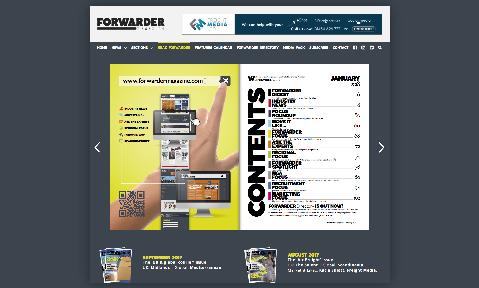MACHINE LEARNING
How can it improve logistics efficiency?

ROAD ABSORBING RISING OPS COSTS with lowest prices in almost two years
ELECTRIFYING FLEETS
...practical considerations
MOVE IT LIKE...

MACHINE LEARNING
How can it improve logistics efficiency?

ROAD ABSORBING RISING OPS COSTS with lowest prices in almost two years
ELECTRIFYING FLEETS
...practical considerations
MOVE IT LIKE...


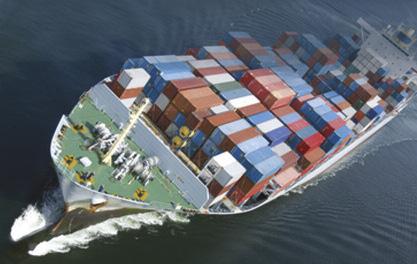









Welcome to issue 78 of FORWARDER. If you’re reading this at our event in Manchester, lovely to see you! If not, we hope to see you at the next one. Details will be available online at FORWARDER .events soon.
In other news, we have a new ‘Move it Like...’ cover feature for you to enjoy: Chrissy Nichols, Director of Atlantic Pacific.
Tim, Designer, FORWARDER magazine




CRAIG EDITOR-IN-CHIEF craig@freightsolutions.com
WILL CONTRIBUTING EDITOR editor@forwardermagazine.com
PAUL MEDIA /EVENTS MANAGER paul@forwardermagazine.com

+44 (0)1454 275 946
TONY SALES EXECUTIVE tony@forwardermagazine.com
+44 (0)1454 628 795
MARK SALES EXECUTIVE mark@freightsolutions.com
+44 (0)1454 628 775

DARREN SALES MANAGER d.glasspool@freightsolutions.com




TIM DESIGN & PRODUCTION tim@forwardermagazine.com
MOHIT DIGITAL & SOCIAL mohit@freightsolutions.com
Headford Group...IFC
Eurgent ...intro

Tymo Transportation...p19
Red Wolf Express...p23
Atlantic Pacific Group...p29 CNS...p51
FreightApp.design...p53
FORWARDER events...p63
BCF...p65
Descartes...p69
Gaston Schul...p83
P4D...p79
Daygard Logistics...p80
Con-tra America ...p83
ForwardingJobs...p94, 103
Headford Group...p104
Freight Mergers...p109
Freight Solutions...p117
FORWARDER directory...p134
Cargo Tech...p131
Transaid...pBC
A system of transporting goods by aircraft.
Related topics
AOG (aircraft on ground)
OBC (on-board couriers)

Air charter
Sponsored by
Air Canada Cargo today announced the start of operations for its Boeing 767 freighter to Liege, Belgium, connecting a key European destination to Toronto and the carrier’s extensive global network.

Flights will operate twice per week to Liege, with service increasing to three flights per week later in the year. Service will originate in Toronto and have a stop in Halifax.
We are pleased to begin operating our freighters to Liege, a further strengthening of the Air Canada Cargo network as we continue to expand and provide customers with reliable, year- round service. This is another important connection from a key European market with Air Canada and Air Canada Cargo’s global network through its Toronto hub.
Matthieu Casey, Managing Director, Commercial, Air Canada CargoThe start of Air Canada Cargo freighter operations in Liege is an honour for us, as well as being now connected to the global network of Air Canada Cargo. Liege Airport has been chosen by Air Canada Cargo as the first ever freighter-only station, which clearly shows the fastgrowing importance of Liege Airport as a leading European cargo hub.
Laurent Jossart , CEO, Liege AirportNext month, Air Canada Cargo will start twice weekly service to Basel, Switzerland, one of Europe's premiere pharmaceutical hubs. Liege and Basel are in addition to the recent start of service to Dallas, Atlanta and Bogota as Air Canada Cargo continues to expand its freighter network.
This latest data comes at a time when some retailers are starting to voice concerns over the hoped for rise in consumer spending in Q3 this year and a resulting need to restock inventory levels. As the costof-living crisis gather pace in prime consumer markets, and the conflict in Ukraine shows no sign of abating, retailers now fear a slower and subdued market, meaning restocking and the peak season airfreight windfall this usually creates may not materialise.
CLIVE says longer-term contracts between shippers and freight forwarders may signal ‘more common ground’ in a stabilising global air cargo market which saw demand dip at a slower -3% year-over-year in March
Longer-term contracts between shippers and freight forwarders may signal ‘more common ground’ in a stabilising global air cargo market which saw demand dip at a slower -3% year-over-year in March, according to the latest weekly market insight from industry analysts CLIVE Data Services, part of Xeneta.
The distribution of shippers’ contract duration in the first quarter of 2023 saw the number of six-month agreements rise to 36% versus 23% in Q4 of last year, a shift which Niall van de Wouw, Chief Airfreight Officer at Xeneta, says could indicate a ‘hunt for volume’ by forwarders which want to lock-in customers for a longer period of time.

I think we’re seeing signs that some forwarders are willing to take a little more risk on what airfreight rates might do because they don’t expect the market to drop much further. Everybody wants to achieve growth, but if the market is not growing, you have to grab a share from someone else. The fact that we see longer term contracts between shippers and freight forwarders is a signal that the market is stabilising. Shippers have regained some ground because of the lower rate conditions, which have affected the airlines and forwarders, but it’s not like the bloodbath we see in the ocean market, he said.
The global airfreight market continued to normalize in March. The -38% reduction in the general air freight spot rate year-on-year produced an average rate cost of USD 2.62 per kg. This figure represented a -4% decline over February. The rate fall is attributed to both shrinking cargo volumes and recovering cargo capacity. Global cargo volumes have been falling for the past 13 consecutive months but showed some sign of relief in March, as volumes registered their smallest drop of -3% year-overyear, the lowest monthly decline in over a year.
International cargo capacity continued to recover in March, recording its largest increase of 16% from a year earlier. The shifting volume and capacity balance is reflected in the global dynamic load factor, which measures both volume and weight perspectives of cargo flown and
capacity available. In March, the load factor of 60% was 6% pts adrift of the same month a year earlier but recovered 6% pts from the seasonal low in January this year.
March 2023 data must also be considered against the market impact created by Russia’s invasion of Ukraine, which began just over 12 months ago.
Among the world’s top three corridors, the previously resilient transatlantic westbound air cargo trade registered its first year-on-year volume fall of -11% in March. This was in line with the latest German and UK manufacturing PMI announced this week, which both indicated shrinking manufacturing activities.
The average general airfreight spot rate from Europe to the US in March fell -46% versus March 2022 to USD 2.71 per kg. It was the only corridor among the world’s top three to record a year-end freight rate increase last year.
The market is yet to see any meaningful impact on air freight rates resulting from recent strikes in some European airports. Germany, France, Spain, and the United Kingdom were the latest countries to face disruption caused by airport strikes, threatening supply chain disturbances. Further industrial action is due in France and the UK over the Easter break.
In contrast to the transatlantic corridor, the outbound China cargo market bounced back compared to global market downturns. Supported by upbeat Chinese manufacturing activities, with its PMI readings showing expansion for two months in-a-row, March volumes out of mainland China grew 30% from last month and were down only -2% from a year earlier. But the growth of air cargo capacity outpaced the growth of volumes. For instance, the capacity from mainland China to Europe restored 63% month-over-month and 155% from a year ago in March.
Air freight spot rates from mainland China to the US and Europe stood at USD 5.07 per kg and USD 3.65 per kg respectively in March, both down -7% month-over-month and -43% from a year earlier. But it is worth noting that for both corridors the downward pressure on rates started to ease from the second week of March, with rates stabilizing until the month end.

Looking ahead, Hong Kong is expected to receive an air cargo boost as the government eases a ban on transshipments of e-cigarettes and vapes products via Hong Kong. The restriction, which was imposed in April last year, prevented cargo volumes equivalent to 10% of Hong Kong’s annual export volumes (source: HAFFA).
Impacted by global economic headwinds, the jet fuel price remains highly volatile. The aviation market expects higher jet fuel costs as crude oil prices soared after last week’s announcement of production cuts from OPEC+, a group of the world's largest oil producers.
Niall van de Wouw commented: We don’t see an air freight market in crisis, we see it finding a new baseline, which we referenced last month when we acknowledged the need to move on from pre-Covid comparisons. If we are seeing a shift to longer-term contracts, this will certainly benefit shippers’ logistics purchasing departments which, due to the level of volatility in the industry, have been forced away from traditional annual deals. Their core business is making pills or smartphones, for example, and not about having to renegotiate air freight rates every week or every month. We see a calming down and a greater appetite for shippers and forwarders to come together on a longer term. There’s more common ground for longer-term deals in a positive way. The next interesting market development is what airlines do with their summer schedules and the further capacity boost this traditionally brings?
NNR Global Logistics UK, part of Japan’s US$4 billion Nishitetsu Group, is looking to stay one step ahead of customer demands in a challenging business environment both by expanding its airfreight portfolio and through further investment in talent and subject matter experts

Head of airfreight development Lionel D’Silva says that, like all logistics partners, NNR was busy during Covid. It became more complicated to move products because of different countries’ Covid policies, but logistics providers found ways to help customers reach their markets, he explains. The high demand plus the logistical complexities meant that prices for transporting goods – whatever the mode – rose.
This drop is partly due to the cost of living crisis: consumers are not buying as much, so there is less demand, whether for individual e-commerce shipments or bulk retail orders. In addition, the market has been flooded with passenger capacity to serve pent-up travel demand in the wake of Covid. This results in double pressure on airlines and logistics providers: both low cargo demand and high cargo capacity cause prices to fall.
The upshot is that carriers and logistics providers are chasing a shrinking volume of cargo; airfreight is a congested space these days.
Noting that NNR is a large organisation dating back to 1908, moving millions of kilos of air cargo every year, D’Silva insists: There are many opportunities. You just have to hustle a little more. Our Kaizen-based approach prompts continual evolution, rather than dependency on historical practices and support.
For instance, he says: It can be very expensive to fly cargo from the UK to places like Australia, Japan, or New Zealand. The cheaper ocean freight option is comparatively slow, with transit times of 6070 days. Therefore, we have introduced a hybrid sea-air option that takes half the time of an ocean freight shipment and costs a fraction of sending an item solely by air.
One instance is that the war in Ukraine has affected oil prices, and airlines are also having to carry more fuel – and less cargo –to avoid overflying Russian airspace.
Now: In the new year, volumes are dropping, capacity availability is increasing and rates are coming down to pre-pandemic levels, D’Silva says. Consequently, revenues are falling for airlines and logistics providers alike.
Going deeper into the reasoning behind the successful new service, D’Silva noted that ocean transport is not without its challenges –port strikes and sailing schedules among them. A cargo of Christmas trees, for instance, can lose all value if it misses a vessel and arrives at its destination after the festive season.
With airfreight, there is less risk: a schedule change today may result in a day’s delay, but usually not much beyond that. Airfreight is often the way to go, D’Silva reasons; but for some locations, and for some shippers, a hybrid approach will be best as it reduces the risk – and transit time – whilst offering a median price point.

Elsewhere: We are looking at expanding our services in Europe for the perishables market – something NNR has vast experience in, in Asia, he adds.

NNR is also tackling the longstanding industry difficulties in attracting and retaining talent within the sector.
We need to nurture talent and continue to develop people sustainably, to learn from our current stalwarts and become the next generation of leaders, D’Silva sums up. NNR is encouraging younger talent to stay with the company long-term by training them well – including exchanging them with overseas branches to learn other methods. We are making the managers of the future.
Its willingness to be flexible in the face of change, and to invest in people, will no doubt see NNR through many more decades as a world-class logistics partner.
Latest WorldACD demand and pricing data provide further evidence of stabilization following the declines seen throughout much of last year and the annual turbulence around Lunar New Year
The latest air cargo demand and pricing data provide further evidence of stabilization following the declines seen throughout much of last year and the annual turbulence around Lunar New Year.
Figures for week 11 (13 to 19 March) show a clear stabilization in both worldwide tonnages as well as the global average rate, compared with the previous week and following several weeks of relative stability since mid-February, figures from WorldACD Market Data indicate.
Comparing weeks 10 and 11 with the preceding two weeks (2Wo2W), overall tonnages are flat versus their combined total in weeks 8 and 9, accompanied by a 2% increase in capacity, whereas average worldwide rates slightly declined by 1% – based on the more than 400,000 weekly transactions covered by WorldACD’s data.
At a regional level, on a 2Wo2W basis, there are still signs of a relatively robust (+5%) recovery in air cargo tonnages ex-Asia Pacific, driven by growth in flows to Middle East & South Asia (+9%), North America (+6%), Europe (+4%) and intra-Asia Pacific (+3%), respectively. The most-notable decreases were recorded ex-Middle East & South Asia to Asia Pacific (-13%), and ex-Central & South America to Europe (-11%), WorldACD noted.
While volumes have been flattening in the last two weeks, on the pricing side average rates have continued to show a negative trend on a 2Wo2W basis from all regions except Asia Pacific (+1%), particularly ex-Middle East & South Asia (-5%), ex-North America (-3%) and exEurope (-3%), WorldACD said.
Comparing the overall global market with this time last year, chargeable weight in weeks 10 and 11 was down 9% compared with the equivalent period last year. Notable percentage decreases in tonnages year-on-year were ex-North America (-19%), ex-Middle East & South Asia (-9%). Also ex-Asia Pacific, the trend compared to last year was negative (-8%) despite the recent positive developments, WorldACD noted.
It said overall capacity has jumped by 14% compared with the previous year, with double-digit percentage increases from all regions. Mostnotable increases were ex-Africa (+23%), ex-Asia Pacific (+17%) and ex-Europe (+16%).
Worldwide rates are currently 32% below their levels this time last year, at an average of US$2.73 per kilo in week 11, despite the effects of higher fuel surcharges, but they remain significantly above pre-Covid levels, WorldACD noted.
WorldACD’s yield figures include surcharges and are a combination of spot and contract rates.
Will Waters, contributing editor, FORWARDER magazine
¹ 2Wo2W compares the last 2 weeks with the preceding 2 weeks this year. YoY compares the last 2 weeks with the same 2 weeks last year.
These trends are based on more than 400,000 transactions per week. This public report only shows high level trends. For our participants we publish weekly data for hundreds of worldwide markets at different O&D levels.




A system of transporting goods by ship.
Related topics
Shipping lines
Biofuels
Ships' parts

Sponsored by

Containerised cargo volumes moved in the deep-sea container shipping market fell a further 2.5% during the final quarter of 2022, marking the traditionally busiest period of the year as the ‘peak season without a peak.’
Volumes have fallen steadily in the early weeks of 2023 and world trade continues to stumble as economies grapple with persistent inflation and high energy prices, suppressing consumer demand for goods across nearly all economic sectors.
Commenting on the publication of the latest GSF/MDS Transmodal Container Shipping Market Review, James Hookham, Secretary General of Global Shippers Forum said: This has stopped being just a supply chain or a shipping issue and shippers and carriers are firmly in the hands of global economic forces which are themselves responding to structural weaknesses in economies and to geopolitical tensions. Predicting volumes and inventory requirements for the remainder of the year is a leap into the unknown for many shippers, as few but the most experienced will have encountered so varied a mix of influencing factors.
With interest rates still high and Central Banks hinting they could go higher still, the inflationary effects of the Covid crisis and the crunch on consumer spending is lingering into the second quarter this year.
On the demand side, many carriers and service providers are anticipating a recovery in demand in the second half of the year, but this is more in hope than expectation – there are few economic signals to support such optimism.
The arrival of new shipping capacity, an apparent questioning of the benefits of shipping alliances and an inevitable reduction in utilisation of vessel space, is also changing the shape of the supply side of the equation in container shipping.
Shippers have undoubtedly benefitted from the dramatic fall in spot rates over the past nine months, with costs on many routes back to preCovid levels. But weak demand for their core products will be of more concern to shippers than the cost of their shipment. Whilst wary of the speed at which demand could recover – as seen in 2020 – many shippers are bracing for a bounce in rates that may not arrive for some time.
Shippers have also been enjoying have seen a sharp improvement in port call predictability with the number of scheduled calls actually made by vessels significantly improved over Q3 2022. This is the first time since in the reviews started in 2020 that the Service Quality Indicators have all been positive, albeit from a low base.


Customers’ refrigerated cargo, requests for service in Korea drive continued expansion
In response to increased customer demand, UWL and Swire Shipping have announced the addition of a new port call for export refrigerated containers in Busan, Korea on the popular Sun Chief Express service.

Many clients have expressed a strong preference for a return to the shorter Ho Chi Minh - Seattle eastbound voyage, as the service was initially conceived, as well as a quicker Seattle – Haiphong leg on the westbound voyage. Swire Shipping’s decision to add this call for export reefer containers in Busan will give export customers additional reach into Asia and provide American agricultural exporters better access to global markets.
Duncan Wright , President, UWLThis new port call coincides with a recent adjustment to the Sun Chief Express schedule, which was made to increase efficiency while also adding the Busan call. The new service rotation is now Seattle - Busan - Haiphong - Ho Chi Minh – Seattle.
We are excited to add this new call to the Sun Chief Express service. Combined with the enhanced change to the rotation, we continue to provide a service that is best in class in the market. As well as expanding capacity to US exporters by using available slots to carry cargo, utilization of otherwise empty slots for repositioning contributes to more efficient use of ships and reduction in net CO2 emissions.
Rufus Frere-Smith, Head of Projects, SwireShipping Americas
Clients using Sun Chief Express for import service can take advantage of UWL's robust presence in the Pacific Northwest, including partnerships with its sister companies World Distribution Services and Pacific Cascade. Together, the companies offer over half a million square feet of retail distribution space in the region. Transloading, cross-docking, and other distribution services are available, in addition to multiple IPI rail connections and over-the-road trucking options to move their freight inland
Importers and exporters alike are assured quick throughput in and out of the port, thanks to strong relationships with the Northwest Seaport Alliance and their partners.
Customers have been thrilled with the progress our reefer export program has made, and now is the time to expand, added Wright. The reliability, efficiency, and commitment to service are second-tonone, and we know these adjustments will help us continue to provide and exceed the level of service customers have come to expect.



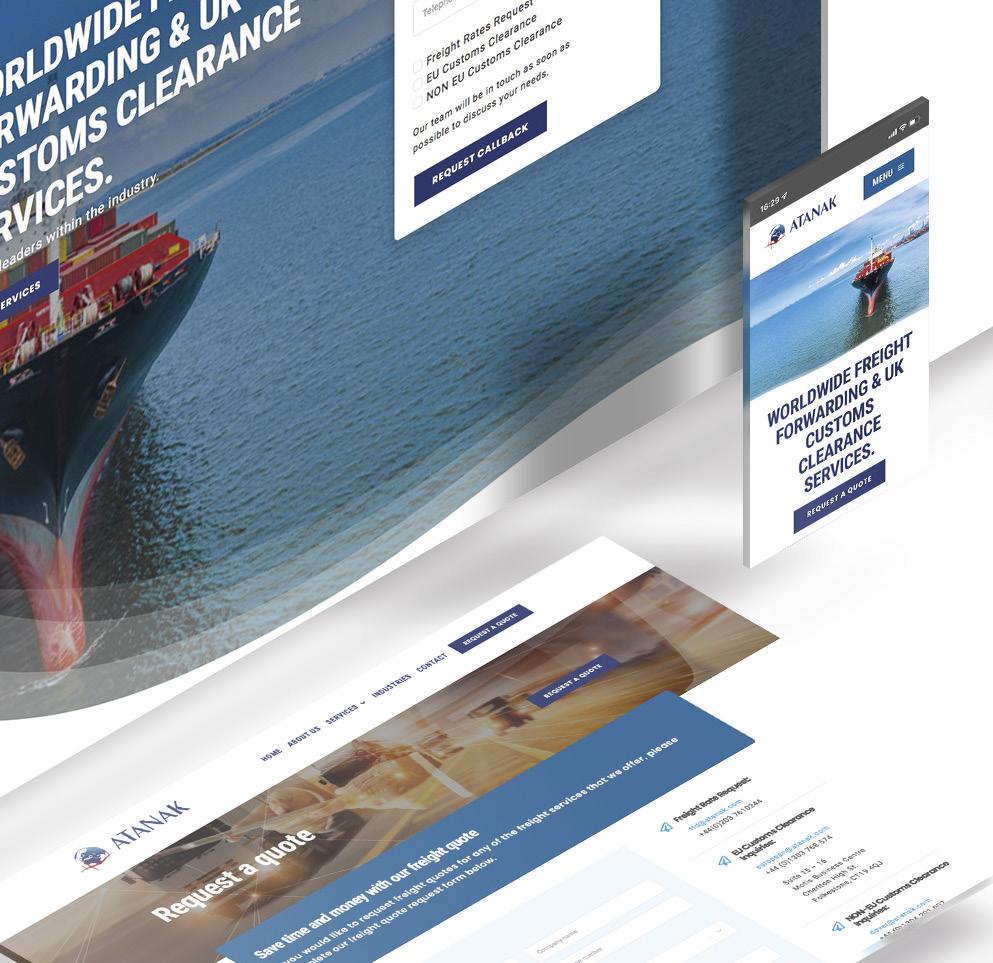




















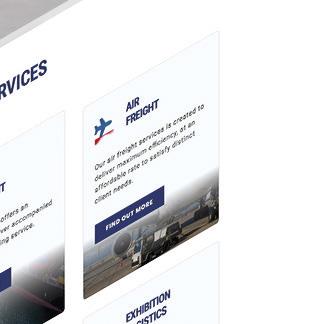

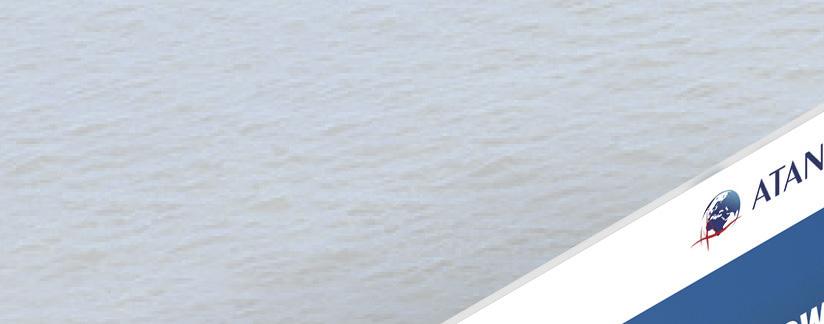






The post-Covid US trade slowdown is impacting household goods demand far more seriously than industrial freight demand, according to analysts appearing on the latest episode of The Freight Buyers’ Club podcast, produced with the support of the Dimerco Express Group.
This explains why since the second half of 2022, the trans-Pacific container trade has seen freight rates and demand drop far more significantly than the trans-Atlantic, and why domestic trucking and air cargo markets have turned bearish.
Jason Miller, Interim Chairperson, Department of Supply Chain Management, Michigan State University, Eli Broad College of Business, believes the U.S. economy is not displaying any serious ‘red flag indicators’ that an economic recession is imminent, but is suffering “a freight recession” that is affecting logistics and shipping lanes in varied ways.
He said US credit card delinquency rates were still below pre-Covid rates, mortgage delinquency rates were falling, wage growth was still ‘very robust’ and demand across key parts of the economy including motor vehicles, parts, heavy equipment and “everything associated with infrastructure” was performing well.
But demand for imported non-industrial products typically shipped by container or via air freight solutions such as clothing, computers, phones and furniture had significantly fallen away.
Anything single family housing related has been very much hit by this huge cool down of housing activity of roughly 30% from this time last year, said Miller.
This is one reason why, according to Miller, the US trucking market has been in recession since the third quarter of 2022.
It also helps explain why the westbound trans-Atlantic container shipping market has been performing far better than imports to the US from Asia, according to Judah Levine, Head of Research, Freightos.
Levine told The Freight Buyers’ Club that the current US freight recession was in part due to heavy imports in the first half of 2022 which had left many retailers with huge inventories. But, he added, this had impacted the trans-Pacific headhaul market far more than US imports from Europe.
If you look at the trans-Atlantic, rates there are still more than double what they were in 2019, he said.
Even though rates on the trade have fallen around 50% since their peak earlier this year, Levine said the decline had been far less severe than on the trans-Pacific where spot freight rates had collapsed.
He said this was because the two trades were driven by different types of imports.
By contrast, the containerised goods being shipped in heavy volumes on the trans-Atlantic from Europe to the US in 2022 were products such as Portland cement, gypsum, electrical storage batteries and other chemical products.
Every year, 241 million containers are transported across the seas with over 7 trillion dollars’ worth of food, clothes, electronics and other goods we all need. While crucial for the smooth functioning of the global supply chain, containers and their cargoes can also harbour and transfer contaminating pests. All parties in the supply chain have a shared responsibility for stopping the spread of pests by keeping cargo and containers clean when in their custody. The updated Prevention of Pest Contamination of Containers: Joint Industry Guidelines for the Cleaning of Containers published by BIC, COA, IICL and WSC provide easy-to-use best practices to help everyone carry out their responsibilities.
The original version of the Joint Industry Guidelines for the Cleaning of Containers, published in 2017, was well received by regulators and industry, and has become a valued source of guidance when it comes to preventing pest contamination. Since then, we have learned more about the transfer of pests, our climate conditions have changed, and trade has grown. Together these developments send a clear message: Pest contamination is an issue of societal concern. In response, industry parties representing different parts of the container supply chain - the Bureau International des Containers (BIC), the Container Owners Association (COA), the Institute of International Container Lessors (IICL) and World Shipping Council (WSC) – are now launching an updated version of the guidelines.
Experience shows that the introduction of new pests can severely upset an existing ecosystem, with serious ecological consequences and possibly billion dollar impacts on a nation’s economy. Regulators and national authorities play a central role in stopping the transfer of pests, but given the scale of global trade it is prevention – stopping pests from
entering cargo or containers in the first place – that is the best solution. With the updated Prevention of Pest Contamination of Containers: Joint Industry Guidelines for the Cleaning of Containers BIC, COA, IICL and WSC are looking to further improve the level of prevention across the supply chain to stop the transfer of pests.
When each party in international container supply chains makes sure to start and end their work with clean cargo and containers, then containers will reach their destination faster while our agriculture, forestry and natural resources are preserved.
Lars Kjaer, Senior Vice President, WSCAll parties in the supply chain - from manufacturers, to exporters, packers, freight forwarders, inland logistics providers, warehouse storage providers, ocean carriers, and importers - must take responsibility for maintaining cargo and containers clean when in their care. By applying the best practices described in this Guide the parties can keep containers and their cargoes clean, fulfilling their custodial responsibility and reducing the risk of pest contamination and transfer.
Download your free copy here: Prevention of Pest Contamination of Containers: Joint Industry Guidelines for the Cleaning of Containers
The Prevention of Pest Contamination of Containers: Joint Industry Guidelines for the Cleaning of Containers are complementary to the direction provided in various guidelines published by the IPPC and in the IMO/ ILO/UNECE Code of Practice for Packing Cargo Transport Units (“CTU Code”) regarding prevention of pest contamination of containers.


A system of transporting goods by road.
Related topics
Groupage Couriers
Last mile
Sponsored by
The haulage price-per-mile has fallen nearly 2% year-on-year and 3% month-on-month, despite diesel prices rising 12% in the last year
In February, the average price charged by haulage drivers and companies fell for the second consecutive month. The year-on-price was also down, despite meteoric rises in inflation and operational costs over the last year.
The latest data from the TEG Road Transport Price Index revealed that haulage prices in February were 3% lower than in January, and 2% down on last February’s figures. In fact, they were at their lowest level since March 2021.
The data shows that despite cost and workforce pressures, haulage companies are still holding back their prices. But with the Windsor Framework potentially signalling closer cooperation between the UK and EU, hauliers will be hoping for an economic upturn and higher profit margins in the near future.
Over the past year, courier prices have told a different story, rising by over 10% year-on-year. In February, however, courier prices also fell by 4% as consumer spending grows slowly and focuses more on services than material goods relying on haulage/courier services.
To survive in such a challenging business landscape, logistics companies will need to devote time to business development. But they also have to increase efficiency and lower costs. One way to do this is by becoming more sustainable.
Demand for lower and zero-emission vehicles is growing as the entire sector prepares to make the transition, hastened by fuel price volatility and the Russian invasion of Ukraine.
There are also seven clean air zones in the UK now, with Sheffield becoming the latest addition. Plus, the EU is calling for a 90% reduction in truck emissions by 2040, which will affect many UK-based companies, regardless of Brexit.
Truck manufacturers are already investing heavily to bring a range of electric, hydrogen and other new technology models to market. Those companies who can afford the initial investment in greener fleets will make significant savings on ongoing operational costs. But before they invest their capital in new vehicles, they might want to see higher profit margins.
A price drop in February is nothing new. We’ve seen exactly the same pattern in previous years, and we’d expect prices to rise gradually as we head into spring. However, this year is somewhat uncertain as the UK narrowly avoided a recession and inflation remains high. Businesses are still scaling back, encouraging haulage and courier companies to keep their prices down, even as they contend with high costs. But the future for freight is still looking promising. There are huge opportunities for development in new technology and sustainability – opportunities that the industry must grab.
Lyall Cresswell, CEO, Transport Exchange GroupBoth elements of the TEG Road Transport Price Index continue to interest. The haulage element of the index still shows year-on-year deflation, which has been ongoing since June last year, despite significant rises in key operational costs. But the courier element carries on with inflation, which is now back into double figures. Bearing that in mind, it’s no surprise to hear that the Bank of England might raise interest rates again later this month, as the overall TEG index comes back out of the Bank of England’s comfort zone.
Kirsten Tisdale, Director of Logistics Consultants Aricia Limited & Fellow of the Chartered Institute of Logistics & TransportBrillDog, the only supply chain technology built for small-tomedium-sized businesses (SMB), discusses how shippers may be confused about when to ship something via parcel or LTL and need to understand which mode to select based on schedules, cost, and the product being shipped. Many shippers think the choice of mode depends on the size and weight of the products, but there are exceptions that shippers should know about.
In the old days, shippers used arbitrary rules that stipulated parcel for shipments of less than 150 pounds and LTL for greater weights. In today’s market, that no longer applies. The decision requires an algorithm to be applied on a shipment-by-shipment basis. Critical variables include which parcel and LTL carriers are being used in addition to tried-andtrue factors including, but not limited to, traffic lane, density, value and even the time of year.
The BrillDog TMS, part of the BrillDog Supply Chain Management System (SCMS), will soon offer shippers LTL, TL, spot, and parcel rates. Besides the size and weight of the shipment, shippers need to consider the following:
• Delivery Requirements – Is the shipments going to a business or a residence? Typically, parcel carriers are better equipped for a routine residential deliveries. While LTL carriers perform this service, it often costs more.
• Fragility of Shipment – Is the item being shipped fragile and needs more protection in transport? If so, the shipper may need to choose parcel shipping. Parcel carriers often have strict packaging requirements for fragile items to ensure they are adequately protected during transport. LTL shipping is generally more suitable for sturdier items, and the items are typically placed on pallets.
• Cost – LTL shipping is more cost-effective for larger and heavier shipments, while parcel shipping is more cost-effective for smaller and lighter shipments. Both carriers assess extra costs for items with poor density and/or extreme length.
• Traffic Lane – LTL carriers set base rates to accommodate for origins where freight is plentiful and for areas where freight volumes are sparse. Each carrier’s network is different and thus, so are the base rates. Parcel carriers tend to be more consistent across geographic zones. Both LTL and parcel carriers will discount for volume and desirable freight moving in the direction that best serves the carrier’s network.
• Time of Year – More and more, carriers in both LTL and parcel are adjusting their pricing and capacity handling limit to accommodate volumes that rise and fall at different times of the year. For instance, parcel carrier rates tend to rise with greater capacity demand around Christmas while for LTL, the same is true as companies tend to fill as many orders as possible at the conclusion of a fiscal quarter or year end.
When it comes to selecting the right transport mode, a transportation management system can help shippers create rules based on historical performance, preferences, volume and more, for selecting the right mode and carriers, streamlining transport operations. API rates calls versus statis table rates will work in concert with the BrillDog operating system to deliver optimal results for smaller shippers. The BrillDog SCMS will level the playing field for small to mediumsized shippers, providing supply chain enterprise functionality for transportation management, claims management, shipment tracking, reporting, and more.






















































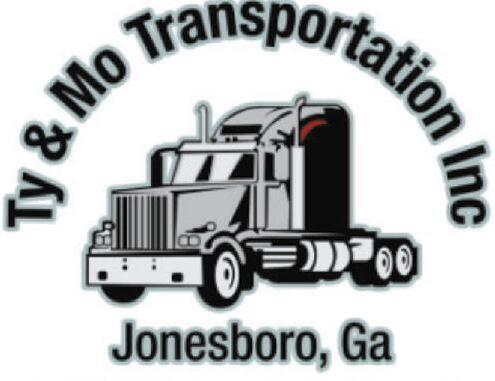

Following a successful three-year partnership, Pall-Ex has today announced that one of Britain’s leading tiles specialists, Topps Tiles, has renewed its distribution contract with the leading haulier.

The two businesses have built a strong relationship and Pall-Ex will now continue to manage Topps Tiles’ palletised home delivery distribution for a minimum of the next two years.
Founded nearly 60 years ago, Topps Tiles has built on a successful philosophy to provide an outstanding shopping experience and unrivalled product range, coupled with exceptional customer service. With more than 300 stores nationwide, it will be increasing its reliance on the PallEx distribution network to support its ongoing expansion. The latest addition to the Topps Tiles retail family is a new online brand, Tile Warehouse, which brings everyday low prices to homeowners across the country.
As part of the renewed agreement, Pall-Ex has introduced an implant scheme, whereby one of its customer service advisors is based at Topps Tiles’ Leicestershire central support office for part of the week. This has already made a noticeable difference to customer support and allows both companies to have a dedicated line of communication when it comes to day-to-day collections and deliveries.
Topps Tiles also makes use of Pall-Ex’s bespoke freight tracking software, MyNexus, which enables its customers to track the whereabouts of their freight along its delivery journey. What3words, the innovative addressing system, is integrated into MyNexus, meaning customers can enter precise delivery locations ensuring they receive their freight exactly where they need it.
Our objective is to deliver world class service to our customers and so effective, reliable last mile delivery solutions have become an even greater priority for our business. Working with Pall-Ex as our trusted partner means we can be confident that our customers can choose and buy the tiles and flooring they want for their home and have it delivered when they require it.
Simon Macdonald, National Transport Manager, Topps TilesPall-Ex has been able to further improve its support to Topps Tiles through the implementation of the London Project, a new and sector-first strategy to improve services and its membership offering in the capital. London has always proved to be a notoriously challenging area for finalmile deliveries due to high levels of congestion, hard-to-reach locations, and parking restrictions being just a handful of problems. However, since the London Project was implemented, Topps Tiles has been able to take advantage of the improved service levels, never dropping below 96.5% on time and in full (OTIF) since the project launched in early 2023.
With such a large distribution area across the UK, we provide a bespoke service to Topps Tiles to ensure customers get their products delivered on time. The support we give to them is a seven-day-a-week operation to ensure we are always keeping up with customer demand. We’re delighted to be continuing to work with Topps Tiles and look forward to building upon our working relationship in the years to come.
Michelle Naylor, UK Commercial Director, Pall-Ex GroupIn response to government’s consultation on the timeframe for MOT tests for light vehicles which closed today (22 March), Logistics UK is holding its position on retaining the current system where the first date a vehicle should be MOT tested is at three years after registration and every year thereafter. Implementing a one-year increase would not be applicable for high mileage vehicles, and would be a detrimental move for vans as they are classified within the same road regulations as cars.

Logistics UK supports the proposal to improve the emissions test as the current method does not check for particulates, which are now identified as a concern to health. The business group asks that this be introduced with a responsible period of notice and recommends a timeframe of 12-18 months to give Logistics UK members enough time to prepare.
The movement of 4.25 tonne alternatively fuelled vans back into the car/van MOT scheme is supported by Logistics UK, due to the vehicle type remaining the same and the change of category (N1 to N2) only being brought forward in response to the accommodation of the heavier weight of the batteries.
Logistics UK is in favour of the additional training of MOT testers and changes to the annual test to fully account for electric and hybrid vehicles, as they are already on the highways and included within road strategies.
As we continue to see more major developments in vehicle technology, it is vital that road policy advances alongside to keep our members compliant and safe. Logistics UK agrees that sections of the current MOT system need to be reviewed and amended to reflect industry’s progression and hopes to see our asks implemented into a new system.
Phil Lloyd, Head of Engineering Policy, Logistics UKLogistics UK is one of the UK’s leading business groups, representing logistics businesses which are vital to keeping the UK trading, and more than seven million people directly employed in the making, selling and moving of goods. With decarbonisation, Brexit, new technology and other disruptive forces driving change in the way goods move across borders and through the supply chain, logistics has never been more important to UK plc. Logistics UK supports, shapes and stands up for safe and efficient logistics, and is the only business group which represents the whole industry, with members from the road, rail, sea and air industries, as well as the buyers of freight services such as retailers and manufacturers whose businesses depend on the efficient movement of goods. For more information about the organisation and its work, please visit logistics.org.uk
Haulage prices have increased almost 3% in the last month, while the August return of the HGV levy threatens significant rises
After a significant drop at the start of the year, the average priceper-mile for haulage and courier vehicles rose 0.4% during March – and 2.8% compared to last year.
The latest data from the TEG Road Transport Price Index has revealed that courier prices continue to fall from their mid-2022 peak, falling 0.7% in March as prices stabilise. Year-on-year, however, they’re up 6.4%.
By contrast, March saw a 2.2% rise for haulage prices, ending a twomonth drop – even as diesel prices came down by 1.8% and closed the gap on unleaded prices.

In his Spring Budget, Chancellor Jeremy Hunt announced that the planned rise in fuel duty will be cancelled, maintaining last year’s 5p cut for another 12 months. This came as a particular relief to vehicle users and businesses reliant on fleets of vehicles.
However, the government also announced the return of the HGV levy later this year. Vehicles that meet the latest Euro VI emissions standards will receive a 10% discount on it, encouraging companies to use newer vehicles.
Coming into force in August, it puts hauliers in a lose-lose situation: pay more for older vehicles or spend to update the fleet to newer/ greener vehicles.
Unlike last year, electric vehicles did not feature in this year’s Spring Budget. In an industry set to be penalised for CO2 emissions with the new HGV levy, many would have expected support for transitioning to greener energy.
A 10% discount on the levy might not be enough for potential EV adopters to make the switch. Steep initial costs, high energy prices and insufficient charging infrastructure are still significant obstacles.
The most positive news from the Spring Budget was undoubtedly the freezing of fuel duty. It came as a welcome relief, as the industry had been urging the government to extend the cut for some time. It’s good to see the government responding to the needs of the logistics industry. The industry is at the heart of the economy, so minimising logistics costs can help prevent additional inflationary strains on both businesses and consumers. Many businesses would have liked increased investment in green energy, as the industry (like many others) is feeling the push to go greener. Pressures like these, combined with stubborn inflation, mean we could see significant rises in the future – and we’re already seeing haulage prices start to creep up.
Lyall Cresswell, CEO of Transport Exchange Group and Integra

The haulage element of the TEG Road Transport Price Index went up in March 2023 – no surprise there as it has been low (still lower than this time last year) and has gone up in March every year so far following the post-peak doldrums. However, the courier element went down in March – the first time it has done this, showing signs of reducing inflation rates …but just prior to oil production being cut in April, which is likely to push this element of the index back up again.
 Kirsten Tisdale, Director of Logistics Consultants Aricia Limited and Fellow of the Chartered Institute of Logistics & Transport
Kirsten Tisdale, Director of Logistics Consultants Aricia Limited and Fellow of the Chartered Institute of Logistics & Transport
The TEG Road Transport Price Index tracks changes in the pricing of road transport services, based on millions of aggregated and anonymised transactions between thousands of transport companies. Data is gathered from completed transactions on the TEG platforms, then aggregated and anonymised. PPM (price-per-mile) is calculated as the average of all completed orders, excluding 0 values. PPM = (sum order values) / (sum order miles). Sample size is circa 2m orders per annum, from circa 8,500 participants.

Christine Nichols, better known as Chrissy, is a great example of what women can offer to – and what they can achieve in – logistics


Traditionally a male-dominated industry, she has pioneered a route from starting out ‘at the bottom’ to being a co-founder and director of the fast-growing freight forwarding, supply chain and container haulage business, Atlantic Pacific Group, while being asked to give inspirational speeches to international freight industry bodies, being a driving force in charitable foundations and a trustee of the Lady McAdden Breast Cancer Trust, and now even being chosen as the first chairwoman in its 70-year history of the London Freight Club (LFC).
She has demonstrated just how much women can contribute to the freight industry and is using her prominent roles in the sector to tell her story and to encourage other women to follow in her path in a business that she loves and that she believes holds out so much opportunity for enjoyment as well as being a satisfying, fulfilling career.
None of this was obvious when, leaving school at 15, she initially looked to a career as an air hostess, anticipating the rich travel opportunities that would be on offer. However, lacking both a requisite additional three inches in height and three years in age for this preferred employment, she took to her second choice – to work as a reporter.
But having failed to get a job with the British national papers, despite at that tender age literally knocking on their doors in an attempt to get work as a junior reporter, her eye was caught by the potential for work with a ‘paper agent’, H H Pegg. Her endeavour and confidence secured her a post there, though it turned out that that wouldn’t be as a reporter – the ‘paper agent’ bought and sold paper rather than produced newspapers.
Nevertheless, Chrissy learnt much about international buying and selling, and she subsequently moved to a new job with a ship chartering and liner agency company, Glover Brothers, that had the same international focus.
From there she moved to Morline, a part of Anglo-Soviet Shipping. Learning the ropes of international shipping – bookings, bills of lading, letters of credit and so on – she also got the opportunity to travel.
And she caught the travel bug. So Chrissy left the UK for what was supposed to be a three-month backpacking trip. It turned out to be a six-year journey, with plenty of experience gained in logistics in parts of the world such as Cyprus, Greece, Australia and New Zealand.
In the last of these, Chrissy’s efforts on behalf of a company involving lessthan-container load (LCL) bookings on the Japan trade saw the business take more consolidations in her first week of work than it had ever done previously. The boss offered her a job not least on the strength of that, and she was with the company – in a division of it that would eventually come under Japanese giant NYK’s wing – for three years.
Then it was back to the UK, and a position at Direct Container Line, a non-vessel operating common carrier (NVOCC), where she started as an inside sales coordinator. Chrissy quickly rose through the ranks, becoming general manager as well taking on other responsibilities. Though she was with DCL for a total of 12 years, her thinking had turned to new challenges.
Chrissy Nichols married her husband, fellow Atlantic Pacific Group director (as well as CEO and chairman) Ashley Nichols in 2000, and together they registered Atlantic Pacific Global Logistics that same year (though it didn’t yet trade at that time).
Ashley had worked for many years in freight forwarding, much of that time as a senior executive with Maersk. His father had also been in the business, and Ashley had always wanted his own freight forwarding company. Atlantic Pacific began trading in 2001, with his father initially in charge, but within a couple of years Ashley and Chrissy were leading the effort and looking to expand.
We had been in the industry a long time, people liked us, and they wanted to join us, says Chrissy. We wanted it to be a family business, with no big company type anonymity, adds Ashley, and that is how we have kept it.
Indeed: That’s what continues to make it special today, says Chrissy. It has a different feel when it is a family business, and we still have friends and family involved today.
Moreover, the company has grown much quicker than they could have expected, she continues. From a strength of 10 or so staff in the early 2000s, the Atlantic Pacific Group now employees more than 200 people. What’s more, Chrissy observes: As a company, you are only as good as your staff, and we have fabulous people, some of whom have been with us from the beginning.
The Atlantic Pacific Group has offices across the UK, as well as in Ireland and even in the US, and consists of four different components:
• ATLANTIC PACIFIC : a freight forwarder and provider of supply chain solutions, was established as we have seen in 2000. It has offices in Basildon, Felixstowe, London Heathrow and Manchester in the UK, as well as Dublin and Cork in Ireland. Plus, an office in Chicago in the US was opened in January this year
• KILLICK MARTIN : a familiar name in British freight forwarding, went into administration in 1999, but Ashley and Chrissy registered the name in 2017 and then reactivated the business in 2019 under the leadership of a former UK managing director of Damco, Paul Gallagher. Ashley acts as chairman and, he says, Killick Martin has enjoyed tremendous success in recent years, being recognised for such by winning the British International Freight Association (BIFA) European and Supply Chain Management Awards in 2021 and 2022, following being a finalist for a BIFA award in 2020

• FREEDOM LOGISTICS : an air freight forwarder and a specialist in temperature-sensitive shipping based at Heathrow Airport, was acquired in 2022
• PORT EXPRESS : a container haulage business, was founded in 2004. From its bases in Felixstowe, Southampton, Birmingham, London Gateway and Doncaster, it operates a large fleet of more than 100 vehicles and 200 trailers
The Group as a whole offers bespoke, highly tailored services to its many customers across a broad range of capabilities, says Chrissy: everything from supply chain management to trucking, warehousing and even air charters. We are also extremely proud to have had an early focus on sustainability, with Atlantic Pacific Global Logistics holding its environmental ISO since 2009. Across the Group we have also been presented with 11 industry awards since 2006.
Away from day-to-day Atlantic Pacific operations, Chrissy is the founder and chairwoman of Unity in Community, a charitable foundation of the Atlantic Pacific Group that supports local and nationally-based charities and community events, such as the ‘Gratitude’ nationwide effort in 2021 to celebrate the heroes of the Covid epidemic, and its ‘Hares about Town’ charitable drive that supported local hospices around Essex.
She gives advice and encouragement to breast cancer sufferers through her role as trustee of the Lady McAdden Breast Cancer Trust –and, as a survivor of the cancer herself, has plenty to offer.
Earlier this year, Chrissy attended the first Females in Freight gathering in Felixstowe to talk about her career experiences and the challenges that women still face in the logistics business. She is an ambassador for Everywoman and a member of the judging panel of the Everywoman in Transport Awards 2023, and has been invited to work with the Institute of Export and International Trade to follow her passion to get more women and young people into logistics.
Plus, she has been asked to be a guest at the Glasgow Freight Club and to talk to BIFA’s Young Forwarder Network later this year.
And Chrissy is now the London Freight Club’s first ever chairwoman in its long history. I always wanted to be part of the LFC, right back to the days of starting out in the industry, she explains. I pushed for female membership of the club then and when Ashley, as chairman of the LFC, opened it up to female membership about 10 years ago, I became the first woman to join. The LFC has a great reputation and I was delighted and proud to be accepted as a member. A couple of years later, she became the club’s first female committee member, then vice-chair and now chairwoman. I’ve had nothing but support from everybody at the club and on the committee, she says.
If there are too few female members of the club, it is not because current members are blocking change, Chrissy insists, and her priority is very much to encourage more women to join the LFC, and she is talking to logistics company owners and managers with this in mind.
There were 24 women members when she took over as chair in January this year and she is hoping to have 50 or so by the end of 2023.

Her other priority as chair is to see the club continue to raise money for extremely worthwhile charitable causes.
Atlantic Pacific’s own record on female equality is impressive –two of its five group directors are women, for example, and discounting truck drivers probably at least half of its managers and employees are female.

Encouraging women to get involved in the industry is certainly dear to Chrissy’s heart, as too is her desire to attract young people into logistics. Meanwhile, alongside her charitable efforts her priorities at the Atlantic Pacific Group are ensuring that the group is a ‘flexibility, caring and supportive employer, embracing equality, diversity and inclusion’ and that the group retains a focus on sustainability.
Meanwhile, the impressive growth path that the Atlantic Pacific Group has been on for more than two decades is expected to continue, fuelled by both organic growth and mergers and acquisitions.




Fleet managers face increasing pressure to meet two conflicting demands: a company’s ambitious decarbonisation goals and the cold hard reality of power availability. In this article, Natasha Fry, head of strategic accounts at Mer, explores the strategic and practical challenges fleet managers face and offers some pragmatic solutions.

While most fleet operators have already begun their EV transition, primarily focusing on the vehicles themselves with the practicalities of charging them a secondary consideration. Maybe the focus should be the other way round. After all, the vehicles will probably be replaced in five to seven years but the charging infrastructure has to take the business much further in the future.
Fleet managers need to think about how, where and when their vehicles will be charged. They will need electrical site surveys to understand what power is available across their estate today, what power constraints there are, and how to upgrade to the levels required.


While there is a range of charging options, for economic and practical reasons most fleet managers will be considering depot charging. The back-to-base charging requirements of commercial fleets is not as straightforward as simply installing some chargers and plugging in as and when the vehicle is back at the depot. Simple things like how many charging depots are required, where they are located in relation to a sub-station could be important and lead to major decisions about relocation and land-purchases. Meeting a fleet’s energy requirements can involve provisioning tens of megawatts of power, and that can take a lot of engineering work to access grid connections.
The UK’s local grid infrastructure wasn’t built with EV depot charging in mind. Many fleet operators are surprised at the low capacity that is available from their local grid. The processes that businesses and distribution network operators (DNOs) need to go through to upgrade supply and bring in new connections is complex. Delays in getting grid access can cause frustration among organisations with fleets that are ready to begin their journey to a sustainable future, especially as installation projects can take months or even years.
Understanding all of the challenges is itself a major undertaking, and for many it is a step into the unknown. Which is why transitioning a commercial fleet calls for a strategic approach. It requires an indepth understanding of where you are now and where you want to be before you can work out how to get there.
Fleet managers have enough to contend with without having to become experts in electrical infrastructure as well. Electrifying the fleet means provisioning new vehicles as well as new source of energy. This adds a whole new world of complexity on top of an already all-consuming role. All while continuing to maintain current levels of service.
Working with EV fleet specialists like Mer can make life a lot easier for fleet managers. We understand the challenges and know what pitfalls to look out for. That is why we have developed a handy guide to take fleet managers through the process and ensure their fleet electrification plans don’t get stuck in a bottleneck.

The use of railroads and trains to transport cargo, as opposed to human passengers.

Related topics
Barge & short sea
Container terminals
Container haulage
Several high-profile accidents in recent months have raised fears about other and potentially more devastating incidents, with particular concerns around the transport of dangerous goods
US rail freight safety is set for a major overhaul following several high-profile accidents and derailments in recent months that have raised fears about other and potentially more devastating incidents, with particular concerns around the transport of dangerous goods.
On 8 March, the Federal Railroad Administration (FRA) announced a plan to conduct a 60-day supplemental safety assessment of Norfolk Southern Railway following multiple safety incidents, including the Norfolk Southern train derailment in East Palestine, Ohio, on February 3, which led to significant pollution of the local area. Several railcars burned for more than two days after 38 cars of a Norfolk Southern freight train carrying hazardous materials derailed in East Palestine, Ohio, United States, with emergency crews then conducting a controlled burn of several railcars at the request of state officials, which reportedly released hydrogen chloride and phosgene into the air.
The National Transportation Safety Board (NTSB), which is investigating the derailment, said the early indications suggested that a faulty wheel bearing on one rail car may have caused the derailment.
FRA said its in-depth assessment of Norfolk Southern was in addition to a number of actions taken by the US Department of Transportation over the past several weeks to improve freight rail safety and accountability to protect workers and communities.
After a series of derailments and the death of one of its workers, we are initiating this further supplemental safety review of Norfolk Southern, while also calling on Norfolk Southern to act urgently to improve its focus on safety so the company can begin earning back the trust of the public and its employees. This comes as USDOT continues its own urgent actions to further improve freight rail safety and accountability.
Pete Buttigieg, US Transportation SecretaryFRA’s safety team will review the findings and recommendations of the 2022 Norfolk Southern system audit and revisit FRA’s recommendations and the scope of the railroad’s responses. In addition, FRA said it will assess the following operational elements:
• Track, signal, rolling stock maintenance, inspection, and repair practices
• Protection for employees working on rail infrastructure, locomotives, and rail cars
• Communication between transportation departments and mechanical and engineering staff
• Operation control center procedures and dispatcher training;
• Compliance with federal Hours of Service regulations
• Evaluating results of operational testing of employees’ execution and comprehension of all applicable operating rules and federal regulations
• Training and qualification programs available to all railroad employees, including engineer and conductor training and certification
• Maintenance, inspection, and calibration policies and procedures for wayside defect detectors
• Procedures related to all wayside defect detector alerts
• Measures implemented to prevent employee fatigue, including the development and implementation of fatigue management programs required as part of FRA’s Risk Reduction Program (RRP) rule
• Current status of the hazard and risk analysis required by the RRP rule
It said information collected through the supplemental safety assessment will exceed the scope of existing FRA audits, providing a more expansive look at Norfolk Southern’s overall safety culture and operations. The information gathered will be used to target specific areas for FRA’s oversight and enforcement efforts and help identify risks beyond the reach of current federal regulations. Finally, FRA will use the information collected to push the Norfolk Southern to develop measures to mitigate risks while identifying appropriate enforcement actions.
With the imposition of tighter safety rules now seen as inevitable, US rail freight industry representatives on 8 March announced an initial set of steps it is taking in its drive toward a future with zero incidents and zero injuries — one where what happened in East Palestine never happens again.
Concurrently, the US Department of Transportation is calling on Norfolk Southern to engage its employees and management around safety in order to protect workers and communities following Norfolk Southern incidents in Reed, PA, Bessemer, AL, Sandusky, OH, East Palestine, OH, Springfield, OH, and Cleveland, OH.
Restoring public confidence, especially in the communities in which Norfolk Southern operates, requires action beyond the six-point safety plan introduced on March 6. Given recent events, Norfolk Southern and all major freight railroads must be taking immediate steps to prioritize safety training and culture along with operational actions that match the severity of recent incidents. Norfolk Southern must prioritize the safety and well-being of its workers as well as the millions of individuals living near routes on which they operate.
The Association of American Railroads (AAR) said: The industry believes that the February 3 derailment and its aftermath require railroads and freight shippers alike to lead with actions that restore trust and that will make a difference in the march toward zero.

Healthy railroads are essential to the U.S. economy, and consistently and reliably safe operations are essential to healthy railroads. Our long history of voluntarily employing safety measures that go above and beyond federal requirements proves our belief in that principle. While we will continue to follow the National Transportation Safety Board’s ongoing investigation in Ohio closely and recognize its deliberate, methodical, and fact-based approach, railroads are committed to taking appropriate steps now.
Ian Jefferies, President & CEO, AARLast week AAR released data that it claimed showed that railroads are very safe and getting safer. This is especially true for hazardous material transportation, where the accident rate is down 78% since 2000. Mainline accidents are down 44% in that same period and reached an all-time low in 2022.











Jefferies added: Rail is indisputably the safest way to move dangerous commodities. Yet we fully appreciate that these data do not comfort the residents of East Palestine and that public trust must be restored through action. Until we achieve our goal of zero, we will maintain our fierce commitment to getting there. While participating in public policy discussions, railroads encourage policymakers to take an objective, data-driven approach. Policy actions taken reflexively that are not likely to achieve meaningful safety benefits could have a wide range of unintended economic and environmental consequences and a negative impact on the safe movement of all goods, including hazmat.
Will Waters, contributing editor, FORWARDER magazine


FELB leases over 4,700 containers quickly and balances fleet across Europe and China
Container xChange's platform enables FELB reduce idle time for containers and find reliable partners
Far East Land Bridge (FELB), a leading railway operator specializing in rail transportation of containers between Europe and Asia, has found success in balancing their fleet and reducing idle time through their partnership with an online container logistics company, Container xChange.
With a fleet of approximately 2600 containers, FELB sought a solution to quickly lease extra units during times of high demand and avoid empty repositioning costs during periods of low demand.
In 2018, FELB joined Container xChange’s leasing platform, primarily using it to book one-way leases when additional containers were needed. However, as they continued to use the platform, FELB also began supplying their own containers to the platform to balance their fleet and decrease idle time.
Joining Container xChange has exposed us to great opportunities to balance our fleet. Imbalance between the Westbound and Eastbound is about 3:1, so we can quickly lease extra units when we have a shortage or supply our units when the market is low.
Alexander Redkin, COO, FELBPreviously, it was a challenge to find reliable partners to move our containers. And when we did, we had to frequently email them to negotiate terms and conditions, which was a very time-consuming
process. Now, with xChange, we can easily find partners to move our containers from Europe to China and all our offers are well structured, saving us time on lengthy negotiations.
Liping Yang & Jinglin Guan, Asset Managers, FELBIn addition to the benefits of leasing and supplying containers through the platform, FELB also utilizes xChange Insights, a tool that provides market container rates and guides the negotiation of leasing contracts with partners. This product has allowed FELB to more accurately determine potential earnings and align its offers to maximize profits.
Insights shows us the market container rates so we can learn our potential earnings and it guides us when negotiating leasing contracts with partners. Jinglin Guan added.
Balancing a container fleet in today’s volatile market can be challenging. It’s more important than ever to have access to real-time data to make efficient and informed decisions. By providing our customers with a platform for leasing and trading containers and insights into market rates, we are enabling them to make smarter business decisions, reduce idle time, and ultimately achieve greater success in the market. Additionally, our platform allows customers to quickly and easily find reliable partners to move their containers, minimizing costs.
Christian Roeloffs, CEO, Container xChangeThrough their use of Container xChange, FELB has gained 55 new reliable partners and leased over 4,700 containers since 2018, while reducing idle time for their fleet. FELB employees also praise the platform for its ease of use and the real-time updates it provides on their stock levels and container locations.
On 17th April, there will be a new intermodal service, operated by TX Logistik between Cologne, Germany and Barking, UK through the Channel Tunnel. This will initially start as a weekly service on a round trip basis and is encouraging the transport industry to consider alternatives to their current supply chain. The service can offer over 1 ton of CO2 emissions savings versus a truck direct movement, as well as avoiding congestion at the traditional ports. Christoph Dörre from TX Logistik and Joe Pickers from JPA Logistics, who are helping lead this initiative, is confident this will be a great alternative for UK businesses to get away from heavy port congestion brought on by a multitude of reasons including Brexit. TX Logistik is one of the largest private company’s and handling over 22,000 trains across Europe every year.
This is an excellent option for supply chains that require a regular flow, and the aim is to increase the service to 3 times per week by the end of Q3 2023. With the new T3000 wagons which is the first time they will be operating gives the options for loading mega trailers (with options to be craned on if required), containers, swap bodies, reefers, and bulk options, this opens up to not only automotive companies, but also retail and industrial.
Scott Boulton, head of NS Logistics and NS Cargo, who are working on supporting companies looking to use the service said, This is an exciting opportunity for companies to look at their supply chain and consider how they can future proof themselves from the reduction of truck driver availability in Europe and improve their impact on the environment. We are pleased to be involved in something that can lead to change in the way businesses move their goods.
For any further details about the service, please contact Melissa Cooper either by email at cargo@nslsolutions.co.uk or call 07305 367133

The transportation of large, heavy, high-value or critical (to the project they are intended for) pieces of equipment.

Related topics
Heavy lift
Abnormal load
OOG (out of gauge)
Sponsored by
FROM FORWARDER MAGAZINE POWERED BY FREIGHTABASE


We are pleased to report ACCIONA Forwarding are new PCN members in Spain. They hold ISO and OEA certification with a extensive reach of offices across the country. With efficient and productive management tools that optimise transport, ACCIONA Forwarding ensure the reliable and professional handling of complex projects.
ACCIONA Forwarding specialises in international project cargo logistics and forwarding solutions by air, sea and land. As well as our comprehensive services and diverse experience, we also benefit from preferential agreements with the main shipping companies and important airlines.
World-leading aircraft charter specialist, Air Charter Service, has announced the opening of a new office in the centre of Mexico City, the company’s 12th operation in the Americas and 30th in total.

Thompson continued: Over the past few years, Marco has built up strong relationships with many clients and airlines in the country and now is the perfect time for him and his team to open up for business. Many of the team have been working in other ACS offices, ready for the move.
This is a very exciting time for ACS, investing and opening up in such a large country with a huge charter market, particularly in cargo. ACS has always had a strong customer base in Mexico, previously dealing with our US and Brazilian teams, but having a presence here now will hugely increase our client base and be closer to our current contacts in the country. We also feel that the office will benefit our US automotive clients who deal with Mexican shipments on an almost daily basis.
Richard Thompson, President, ACS AmericasHeading up the operation is Marco Circosta, who joined ACS nine years ago, and has worked in multiple ACS offices around the world, along with focussing on the Mexican market for the past two years.
Circosta added: This office has been years in the planning and it’s great to see the hard work by everyone pay off. The team has all been working from different offices, so it’s great to finally come together and we’re raring to go.
CargoBeamer, the leading operator of rail connections for noncraneable semi-trailers in Europe, is expanding its portfolio by establishing a service for first and last mile transportation by road (“drayage”). The concept serves as an optional add-on to CargoBeamer’s regular rail connections by providing a road traction solution for our clients’ semi-trailers. It will commence operations during the second quarter of 2023.

An integrated drayage solution makes intermodal more accessible for both existing and new customers who are working on shifting road transports to rail. Additionally, it allows transportation companies to assess the increasing shortage of truck drivers by optimizing their utilization. The drayage service is offered in the following regions: northern Italy, western Germany & Benelux, northern France, southern France & Northeastern Spain, and large parts of the UK plus Ireland. It will connect all terminals in the network of CargoBeamer to third-party locations, warehouses, and Ro-Ro ports of the region.
First test trials have already been completed on the Kaldenkirchen <> Domodossola route, where the transport of semi-trailers in both directions was extended by road to the port of Genoa. Bookings of the new service will be made via the integrated “eLogistics” system of CargoBeamer. When ordering first or last mile transportation, clients can choose between a single or rotational model. All emissions caused by first & last mile transportation by road will be covered by the carbon neutrality program of CargoBeamer and therefore offset by using gold standard certificates.
CargoBeamer has always pursued the goal of making intermodal logistics more accessible to road transport companies across Europe. By adding this drayage service, we are lowering another important barrier that especially held back small and medium-sized freight forwarders from shifting semi-trailers to rail. An integrated trucking service for virtually all types of semi-trailers lowers the costs of organizing intermodal transport significantly and will allow companies with little or no road-to-rail experience to start using CargoBeamer for the first time. Our clients will also benefit from an increased throughput rate of units moved by truck drivers and a fully carbon-neutral supply chain when using CargoBeamer.
Boris Timm, Chief Operating Officer, CargoBeamerAny place where goods are allowed to pass, by water or land, into and out of a country and where customs officers are stationed to inspect or appraise imported goods | logistics hubs where goods are stored under ideal conditions, for onward distribution.
Related topics
Cargo handling

Container terminals
Drayage
Warehousing
Pick ‘n’ pack
Sponsored by

Aproof-of-concept trial for autonomous vehicles to move cargo between the warehouse and apron has commenced at Josep Tarradellas Barcelona - El Prat Airport as part of an innovation project between partners, Worldwide Flight Services (WFS) and Aena, the main airport operator, with 46 airports and 2 heliports in Spain. The project is aligned with the first automated ground vehicle (AGV) guidelines being developed by IATA’s Ground Operations Automation and Digitization working group (GAD), which WFS has also been participating in. WFS and Aena have been joined in the 10-week trial by three other key partners:
• FASEREK: with more than 38 years’ experience in designing, manufacturing and selling ground support equipment, provides innovative and sustainable solutions to ground handling operations
• MOVVO: has been providing intralogistics solutions for more than 15 years. They put together all the experience and technology to design and automate vehicles, like the AGV tractor that has been used for this PoC
• SIMAI: Founded in 1950, they are specialist producers of reliable and robust towing tractors to support airport ramp operations and other logistic industries
The use of AGV technologies offers significant advantages, including 24/7 operational capability and resource optimisation. The proof-ofconcept trial in Barcelona will monitor the AGV’s ability to provide smooth driving at a constant speed as well as safety, flexible routing, monitoring, and traceability of the service, also provided by the WFS telemetry and geolocation solution supplied by XOPS. Looking to the future, the use of AGVs will help airport service providers improve operations planning and favour efficient equipment pooling, leading to measurable sustainability benefits.
The first phase of the Barcelona trial involves cargo transport operations between the WFS cargo terminal and Terminal 1 using a ramp tractor equipped with AGV technology along a planned, point-to-point route of 2,300m. Aircraft manoeuvring areas will not be entered, or aircraft interacted with at this stage of the project. Using AGV technology, the cargo towing tractor is able to recognise its environment, position itself accurately, detect obstacles at 4 and 10 metres, and act to allow traffic and avoid collisions.
WFS has prepared a specific risk assessment for the test, based on the first draft provided by IATA, and shared with Josep Tarradellas Barcelona-El Prat Airport.
AGV technology is already well-established in other industries. One of our partners, MOVVO, already has different autonomous fleets running, mostly in the automotive industry in Barcelona. Through our test project, WFS will learn about the viability of automated vehicles in a busy airport tarmac environment to help us understand any limitations or challenges we will need to overcome before any future deployment of this technology at airports around the world. We have selected Barcelona for this trial because of the progressive approach of Aena to automation and sustainability, and because the perimetral tarmac road linking WFS’ premises and the Terminal 1 provides an ideal environment to conduct this assessment. Given that WFS handles cargo onboard more than 25,000 import and export flights a year at Barcelona, and more than 42,000 flights in Madrid, the future benefits of AGV technology are obvious in terms of productivity gains, safety, and sustainability, and this can ultimately be replicated at airports across the globe.
Lordi Campderrós, PMO manager, WFSThe Chancellor’s Spring Budget could help businesses looking to boost warehouse performance through automation. Craig Whitehouse, Managing Director at independent systems integrator, Invar Group, looks at what’s on offer from the Government.

The business case for investment into warehouse automation is gathering pace. Poor labour availability is increasing risk at peak, costs are rising and volumes are volatile and unpredictable, demanding greater operational flexibility and scaleability.
Warehouse automation addresses these issues but, what can the Government do to help and what’s on offer following the Spring Budget?
The ‘super-deduction’ introduced by then-Chancellor Rishi Sunak in 2021, which allowed businesses to set 130% of the value of qualifying investments against their Corporation Tax liability, was potentially a game-changer, but was only for two years – too short a timescale for many companies to plan and implement investments which could fundamentally change their warehouse operations. Charles & Dean, the finance brokers, estimate that only 40% of transport and logistics companies took advantage of the super-deduction.
In Jeremy Hunt’s March Budget, however, the concept of ‘full expensing’ – that is, enabling the full value of a qualifying investment to be offset against tax in the year it is incurred – has been extended, albeit only at 100% rather than 130%, for at least the next three years. The intention is to make this permanent ‘when circumstances allow’. That is worth 25p in the pound on the Corporation Tax bill which, as the tax rate has gone up, is about the same saving as the super-deduction offered.
There are actually several schemes. Companies paying Corporation Tax can claim for an uncapped level of qualifying investment, but all enterprises, including partnerships and unincorporated businesses, have an Annual Investment Allowance (AIA) to fully expense up to £1 million.
The AIA distinction matters because, unlike the uncapped scheme, the AIA also covers leased assets – increasingly important for businesses that wish to ‘flex’ the number of, for example, Autonomous Mobile Robots (AMRs) they employ in response to changing demand. The AIA also covers deposits and stage payments, whereas the larger scheme requires the investment to have come into use.
‘Qualifying investments’ cover most aspects of a warehouse automation project – in fact, supporting documents from HM Treasury specifically mention warehouse equipment. So fixed and mobile equipment, computers, printers, handsets, terminals, electrical and pneumatic systems, data cabling all qualify.
These changes, especially if they become permanent, will move the UK from being one of the least, to one of the most, attractive tax regimes for business investment in plant and machinery. Of course, no business should be justifying investment solely on the basis of tax savings, but the Government’s latest initiative may help make any beneficial automation project significantly more attractive and, importantly, affordable.
Further independent advice on the latest technologies transforming operational performance in the warehouse can be found at: www. Invargroup.com
Kent-based transport and logistics provider S&S Distribution has created up to 2,000 pallet spaces to provide a solution for the ongoing high demand for warehousing space, brought on by the massive stockpiling and the continuing desire to secure competitive pricing.
Located in Tonbridge, just over an hour from Folkstone and Dover, S&S Distribution, which is part of Palletline Logistics, operates a 50,000 sq ft fully racked warehousing space, split between two separate warehouses with CCTV and 24/7 security and remote monitoring.

As the ongoing demand continues to overtake supply, the struggle to source warehouse capacity has had a serious effect on industries across the country.
We are delighted to have been able to free up this extra space for our clients so they can take full advantage of S&S Distribution’s facilities. The added space within our secure units can be used to store general haulage as well ambient food, organic and hazardous goods for which we have licenses in place. We are also able to accommodate both EU and US standard pallet sizes.
Romas Kusneraitis, Director, S&S DistributionS&S Distribution employs 90 staff, including 50 drivers, and operates 47 vehicles and 43 trailers comprising a mix of double decks, straight frames and urban. Boasting FORS Bronze standard accreditation, S&S includes Amazon, XPO, Freightroute and Hazchem among its 200 customers nationwide primarily serving the Southeast.
2,000
Offering tailormade packages to cover all aspects of the supply chain, S&S Distribution can assist clients from receiving container loads of stock for palletisation and storage to onward delivery either via the Palletline or Hazchem networks or on a dedicated vehicle.
The creation of these warehouse spaces demonstrates how we consistently aim to support our customers and meet industry demand. As a business we aim to become an extension of our customers’ businesses providing the highest levels of customer service you would expect your own team to deliver, concluded Romas.
20 MARCH 2023 | Source: S&S DISTRIBUTION
Digitalisation: leveraging digitisation to improve business processes. (Digitisation: converting information from a physical into a digital format. Digital Transformation: the use of new, fast and frequently changing digital technology to solve problems.)
Sponsored by

Nexyst 360’s transport assets equipped with Nexxiot’s Asset Intelligence technology revolutionize supply chain accountability
Nexyst 360, an innovative grain transportation solution provider, has partnered with Nexxiot to digitalize its entire fleet of grain shipping containers with zero-maintenance IoT connectivity hardware. This enables real time transport intelligence across the entire journey, with user services made available through Nexyst 360’s software solution – Traceable AG, LLC.
Traceable AG, LLC links farmers, buyers, and retailers/consumers who use Nexyst 360’s ‘smart’ NexBox container to drive higher standards in farm produce transportation and accountability. Nexxiot hardware and software, when combined with the NexBox container and Traceable AG platform, enables improved farm-to-consumer security, efficiency, and provenance monitoring and provides next-level quality assurance.
Nexyst 360 will deploy 5,000 of Nexxiot’s Globehopper IoT gateways and Cargo Monitors (cargo condition monitoring sensors). These devices will enable Nexyst 360’s / Traceable AG customers to benefit from the latest innovations in Asset Intelligence technology, including real time monitoring of location and cargo conditions. Stakeholders receive supply chain insights and customizable alerts around risks and events that require intervention based on real-time data.
Nexyst 360’s unique NexBox container and digital services are made available via the Traceable AG, LLC platform to increase food security and human safety from loading to delivery. By mounting Globehopper gateways to the containers exterior and including Cargo Monitors inside each container, Nexyst 360 makes it possible for its customers to achieve inside-out visibility of assets to optimize food supply chain processes and support the highest standards of food transportation in the world.
This partnership with Nexxiot is an important milestone for Nexyst 360 and Traceable AG, LLC, as it encompasses the complete digitalization of our transatlantic fleet. We make it possible for our agricultural customers to maintain a high-quality product from the field to the point of delivery. We are the link between the farmers and the market, and this new capability sets the bar for grain transportation quality by focusing on accountability, transparency and speed.
Robert Ankeny, Operations Manager & Partner, Nexyst 360 & Traceable AG, LLCThese containers covered more than one million miles in the past five months, carrying over 11 million pounds (5 million kg) of grain and food products globally. The digitalization of this fleet is a significant step –supporting a deep commitment to quality control for the benefit of grain producers and consumers.
We are changing the future of grain transportation and are excited that Nexxiot is able to equip our client’s fleet to ensure visibility throughout the entire shipment journey.
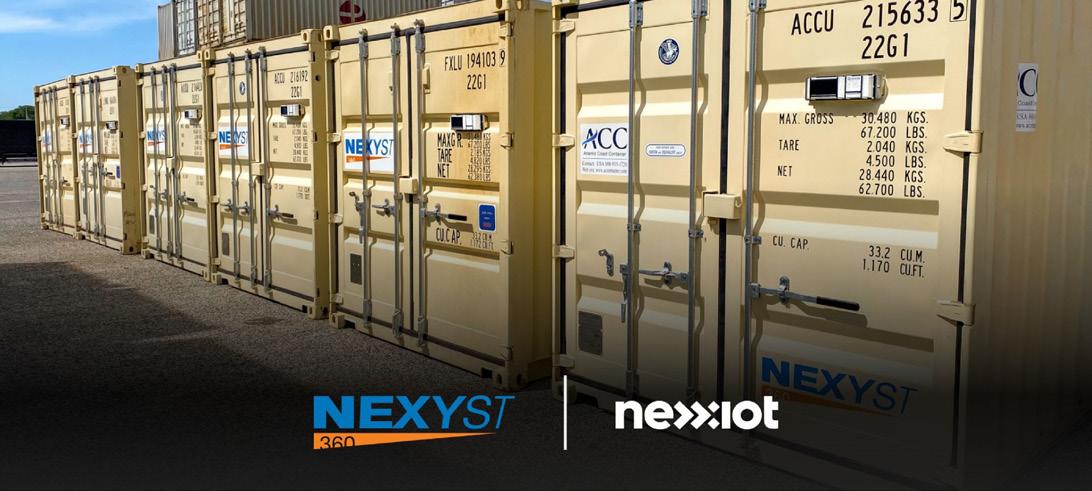 Kenneth Mannka , Executive Vice President of US Operations, Nexxiot
Kenneth Mannka , Executive Vice President of US Operations, Nexxiot
Leading global freight forwarding specialist Action Forwarding is reaping the rewards from adopting Cargowise, the world’s leading system for freight forwarders and logistics providers.
An all-in-one single platform solution that enables freight forwarders to efficiently choose, book, confirm and change shipments in real time, Cargowise has swiftly become a revelation for the logistics sector since its launch by WiseTech in 2014.
The platform, enables Action International to execute complex logistics transactions and manage their freight operations from a single easy to use system, whilst ensuring customs compliance has been adopted at a time of an ongoing period of growth for the British forwarder.
Established in 1990 by founders Peter Murphy and Eddie Buist, the Liverpool-based forwarder has gone from strength to strength since it first opened its doors over 30 years ago.
Action has a vast network of agents spread across the globe, a team of 38 staff, a 40,000 sq. ft. warehouse based in Ipswich, as well as dedicated offices in both Liverpool and Manchester and the forwarder has built a stellar reputation as a service-led forwarder that continually strives for excellence.
With a strong presence in pharma, drinks, fashion and sports, the company has further extended its range of services with a fulfilment offering which has become a growing arm of the business further necessitating Action had a robust system in place.
During a time where digitalisation is sweeping through the forwarding industry, Action International’s decision to implement Cargowise has enabled them to level up their offering to new and existing customers – launching the business into a new chapter.
In order to facilitate the smooth transition, Cen Group – a Platinum Partner of Cargowise – were called upon to guide Action through the platform and help configure the system to their specific requirements.
Cen Global, which offers operational expertise for logistics and transport requirements in the UK, Europe, Middle East, Asia and beyond, have become one of Cargowise’s most valued partners in recent years, following their proven track record in helping new users to implement, configure and optimise the platform.
We had previously operated via a Sage system however as we have continued to grow and develop was no longer fit for purpose. Through embracing Cargowise we have propelled Action International into a new and exciting era, whereby we will be able to have a direct link to a customer’s shipment, providing them with total transparency in the event of any delays – ultimately streamlining their own operations further. The move to Cargowise has been groundbreaking. We are now able to provide the same best-in-class offering as many of the industry’s best-known forwarders – and as such puts us in a positive position moving forward with regards to acquiring or retaining new and existing customers. Special thanks must go out to CenGlobal whose help and expertise have been pivotal in our transition to implementing the Cargowise system. Through helping us to set up, configure, and customise the platform to our own bespoke needs, we are now able to seamlessly leverage the CargoWise platform for the benefit of our customers.
Peter Murphy, Director, Action InternationalWe were delighted to assist Action International in embracing the Cargowise platform by helping them to adopt best practices from day one. Their introduction of CargoWise was timely as it aligned with the move from CHIEF to CDS for customs declarations; CDS is fully supported by CargoWise and is fully integrated. We’re also working with Action to help them link electronically to their customers – many of whom use SAP and similar platforms. Cargowise has shown to not only improve overall operational performance levels, but also help standardise business rules and processes, together with maximising productivity across an organisation’s entire operation. From capacity planning and rate management to vessel booking and list-mile trucking, through Cargowise’s fully integrated platform businesses are able to seamlessly automate and optimise their entire forwarding operations – providing them with an unrivalled system that places them at the forefront of their industry regardless of their shape or size.
 Steve Cross, Director, Cen Global
Steve Cross, Director, Cen Global
Clients can move freight more efficiently to provide exceptional service in volatile market conditions
E2open Parent Holdings, Inc. (NYSE: ETWO), the connected supply chain SaaS platform with the largest multi-enterprise network, announces an expanded partnership with Loadsmart, allowing shipper clients to access instant pricing on any lane from Loadsmart’s network of more than 45,000 carrier partners without leaving e2open’s Transportation Management (TMS) application.
Loadsmart is now included in e2open’s Carrier Highlight innovation, which offers shippers access to featured transportation providers’ rates and capacity when favorable. The enhancement gives clients a streamlined and automated way to identify cost-saving opportunities while getting reliable service from a preferred e2open carrier partner showcased within the application. The shipper can seamlessly onboard Loadsmart to benefit from the currently highlighted cost savings and access Loadsmart as a new carrier partner for future savings opportunities.
With API connectivity in e2open Carrier Marketplace, pricing comparisons happen instantly, enabling shippers to take immediate action. In addition, carriers in the network are afforded exposure to more shippers. As part of the Carrier Highlight workflow, e2open TMS users are presented with optimal transportation options dynamically during load planning, when there is an opportunity to tender the shipment at a lower cost.
E2open is the connected supply chain software platform that enables the world’s largest companies to transform the way they make, move, and sell goods and services. With the broadest cloud-native global platform purpose-built for modern supply chains, e2open connects
Since its inception, Loadsmart has delivered value to its shipper clients by entering strategic partnerships with companies committed to being leaders in their space. Our expanded partnership with e2open allows all shippers to react quickly to market dynamics and move freight reliably and sustainably at an optimal cost—all from within the e2open TMS. We look forward to continuing to push the frontier of end-toend freight management and to empower our clients further as they progress their supply chains toward digital maturity.
Felipe Capella , CEO, LoadsmartLoadsmart has been an e2open strategic partner since 2020; the expanded partnership provides e2open clients with access to real-time rates across their entire transportation network with the opportunity to achieve savings in all modes.
We formed our partnership with Loadsmart around a shared ambition to advance transportation management and seamlessly connect logistics to larger enterprise supply chain strategies. In this next phase of our partnership, clients will be able to simplify rating complexity across their entire transportation network and take advantage of the best rates per shipment to move goods cost-effectively and deliver reliably on customer commitments.
Peter Hantman, COO, e2openmore than 400,000 manufacturing, logistics, channel, and distribution partners as one multi-enterprise network tracking over 13 billion transactions annually. Our SaaS platform anticipates disruptions and opportunities to help companies improve efficiency, reduce waste, and operate sustainably. Moving as one.™Learn More: www.e2open.com.
The CNS suite of products is designed to provide users with the most efficient and robust technology, combined with a world-class support helpdesk.



Simple, intuitive, and easy to use cloud-based platform to submit CDS, CHIEF and UK transit declarations. Our technology allows users to submit declarations for CNS, Pentant and MCP ports, with CCS-UK integration on the roadmap.

Our suite of Cross-border Management products, BEEMS, has been developed to remove complexity and reduce paperwork, saving significant time and offering reassurance that movements are complying with relevant regulations.






BEEMS Border Management products support businesses managing movements across borders on RORO pre-lodgement routes between the UK and EU, providing direct access to all the relevant customs systems.










HMRC-approved port community system that supports many of the largest maritime ports in the UK, enabling business and government stakeholders to securely and reliable exchange information and collaboratively manage cargo movements.
The system is fully approved by HMRC for imports, exports and transhipments at temporary storage locations, and provides users with real-time visibility of unit and cargo status as cargo moves through the port environment.
7 MARCH 2023 | Source: ALIBABA CLOUD
Four in five businesses in Asia are planning a full cloud migration by 2024
Security, local support and pricing continue to drive public cloud adoption
Eighty-four percent of existing users of cloud services are expecting to increase their investment in cloud technology in 2023, while more than four in five (84%) are planning a full cloud migration in two years, as stated in a new survey report entitled The Next-Generation Cloud Strategy in Asia , commissioned by Alibaba Cloud, the digital technology and intelligence backbone of Alibaba Group.
As more companies move their critical businesses online to efficiently handle their workloads in the post pandemic world, businesses in Asia that are already using cloud services plan to increase their investment across various cloud strategies over the coming year.
The increase will most likely come from Thailand (95%), Indonesia (94%), the Philippines (91%), Hong Kong Special Administrative Region (S.A.R.) (83%), and Singapore (83%), while a larger percentage of the surveyed businesses in Japan and South Korea indicate that they will maintain their current levels of investment. Among the key industries, the gaming sector is expected to see the sharpest increase in cloud investment, followed by Media & Telecommunications, Internet & Technology and Financial Services.
In terms of investment priorities, a larger share of businesses in Asia will focus on data analytics & AI (53%), cloud computing (52%), and automation (46%). The fact that more than half of the businesses plan to increase investment in cloud computing underscores the importance of cloud infrastructure in supporting business growth.
The latest research reveals important insights for businesses and cloud services providers in Asia. Cloud adoption has become a prerequisite for businesses to succeed and our customers are adopting a diverse cloud strategy to drive business growth in the digital era. With cloud infrastructure being the ultimate foundation for many cutting-edge innovations such as generative AI, we are as committed as ever to providing proven cloud-based solutions for businesses in different industries and supporting their seamless migration to the cloud services.
Selina Yuan, Vice President, Alibaba Group; President, International Business, Alibaba Cloud IntelligenceWhile more than two-thirds (69%) of the overall surveyed businesses have used cloud for at least three years, those in Hong Kong S.A.R., Japan and Singapore are the earliest adopters with only one in five (20%) having less than three years of experience using cloud services. Industry-wise, Internet & Technology, Manufacturing and Financial Services show the highest level of cloud maturity.
Alibaba Cloud commissioned global market research firm NielsenIQ to conduct the survey, with an aim to better understand the state of adoption of the prevailing cloud strategies – private, public and hybrid – across Asia
The research also reveals that 84% of the surveyed businesses expect to fully migrate to the cloud within the next two years, partly driven by new needs that emerged during the pandemic. More than a third (36%) of respondents even anticipate a complete cloud migration within the next six months. Among the surveyed businesses, the impact of COVID-19 has led to significant changes in their use of IT, with 54% reporting an increased use of cloud-based software and 41% reporting acceleration with their cloud migration.
At the time of the survey, private cloud (40%) was the most popular strategy in Asia, followed by public cloud (27%). Strong reputation for security, reliable local support and attractive pricing are the main reasons for businesses to choose public cloud, in which 38% of the surveyed businesses are expecting to boost investment by more than one fifth in the coming year.
In the Asian markets surveyed, South Korea has the highest public cloud adoption rate (43%). The top sectors currently using public cloud are Gaming, the Public Sector, Retail, and Internet & Technology.
Meanwhile, hybrid cloud adoption is on the rise, with the survey recording a 7 percentage-point net increase in current adoption rate compared to the respondents’ initial cloud strategy adoption. Moreover, of the respondents who have changed their cloud strategy, the highest proportion of 39% have switched to hybrid cloud. In addition to security, businesses tend to choose hybrid cloud for customised cloud services.
The variety of cloud strategies adopted in Asia indicates that more businesses are looking for robust, resilient, secure and flexible infrastructures to digitalise their business. As a leading provider of cloud services, we will continue to introduce innovative and secure public cloud services to satisfy this demand, Yuan added.

Machine learning enables many industries to innovate and automate like never before — logistics and supply chain proponents included. It does this merely by ingesting troves of data, analyzing the resulting information and parsing it to create actionable insights. As that may seem like a lot of buzzwords, the important takeaway is that it scours large data stores, then generates applicable information to make more informed decisions.
The technology is a relatively intuitive offshoot of artificial intelligence, which many businesses are adopting to keep up with today’s hyper-digital landscape. Perhaps one of the most effective uses of the technology is its ability to predict future events through historical data analysis. In fact, this is precisely how it will improve logistics and the supply chain.
Measuring the probability supply chain disruptions will occur over the coming months is done using performance and real-world data about materials sources, labor availability and market costs. With this information, it is possible to predict what might occur and prepare operations for the probable event. It is also referred to in the software and technology world as logistic regression.
With machine learning technologies, the accuracy of these predictions is much higher. Traditional statistical models use predefined configurations to generate a forecast, all based on historical and consumer demands. ML tools can improve these models further, redefine them for unexpected events and better prepare operations all across the supply chain, not just locally.
While significant events and disruptions are critical to know about, many factors influence the supply chain’s performance and productivity. Container shipping lanes transport up to 80% of the world’s trade goods, so weather patterns, lane disruptions, and even changing channel currents can affect how fast the supply chain moves or does not. Understanding these influential factors can help prepare the entire industry.
If there is a materials shortage, a factory shuts down or the shipping lanes are closed, that will cripple all parties. This scenario is exactly what analysts are seeing with the semiconductor supply chain and minor electronics, which have been slow to recover over the past few years.
Predictive analytics spearheaded by machine learning and AI platforms can identify these influential factors, plan accordingly and even discover new ones. The best part is that the technology can create models to understand how something might happen and what might occur within the supply chain as a result. That allows all supply chain players to deploy a proactive measure before a major event can cause harm.
If supply chain players know a particular material will become harder to acquire, they can pivot by finding an alternative or carry out the necessary R&D when one is not available. Before you can even get there, however, you need to know what is coming and why — that is what machine learning offers logistics probability.

From warehouses to fleet management — including under or overstocking — machine learning can automate this work and better prepare for incoming changes. Computer vision models can track what is coming in, goods output, equipment and inventories to ensure the operation stays optimized and smooth, regardless of what happens with the greater supply chain.
Since one weak link in the supply chain can create serious headaches, assessing and maintaining optimal conditions is necessary for continued success. For example, the U.S. Department of Transportation has set a cap on gross vehicle weight for ground transports and trucks at about 80,000 pounds. In addition to weighing fleets before they leave, they must also be monitored throughout their journeys because certain factors can change those weights, such as adding new freight along a route or filling fuel tanks.
Tying that back into machine learning, it is beneficial to know advanced analytics solutions can help make optimization a reality. By monitoring fleets via smart technologies and ensuring they meet

the proper guidelines, everything runs smoothly. That also explains why smart fleet management is seeing incredible adoption and is expected to be worth $565.1 billion by 2025.
Machine learning can use historical data to predict shipping times, identify ideal methods or even help discern when a particular form of shipping might be necessary. A common use of this technology is to provide customers with arrival estimates for their orders. That historical data helps determine an average travel time between transportation and deliveries to a particular destination. Supply chain players can take that a step further by introducing some potential deviations, giving a behind-the-scenes look at delays and other events. This enables a certain degree of experimentation, allowing teams to see how shipping times might be affected by optimizing or mitigating various stages of the process.
Between materials shortages, economic shut-downs, factory closures and bankruptcies, many things happen in the day-to-day that directly affect the supply chain. Leaders can discover the impacts of these stressors using machine learning and predictive models, then discern how to plan, react and what all of it will mean for their regular operations.
Naturally, consumer needs and demands change, whether from an unpredictable economy to labor and supply issues. It is not always possible to know what will happen, at least not without the right tools and data. That is where machine learning can make a huge dent. Demand forecasting is not just possible but valuable — AI and ML-based supply chain analysis solutions can reduce prediction mistakes by up to 50%.
The reality is logistics models and simulations offer many benefits, and the underpinning technology fueling those solutions is machine learning and advanced AI. It can help accurately predict shipping times and ideal methods, supply chain changes or events, standard management processes, demand forecasting, and potentially even factors experts are yet to see.
Understanding just how machine learning is poised to revolutionize logistics probability and forecasting techniques gives businesses a leg up over the competition, maybe even the bulk of the market.
Emily Newton, Editor-in-Chief, RevolutionizedOpportunities to network and promote your services.

Related topics
Conferences
Expositions
Networking
Sponsored by

230 freight forwarders from more than over 60 different countries participated in 6000 one-to-one meetings in Phuket
The Cooperative Logistics Network’s 6th Annual Meeting which was held from 11th to 13th March at Le Meridien Beach Resort in Phuket, Thailand, has been an out-and-out success. The event has brought together 230 members of more than 60 different countries for three days of networking and entertainment, a 25% increase in attendance comparing to the previous one. Attendees have also had the opportunity to learn about the latest trends and innovations in the freight industry and connect with other professionals in the field.
The primary objective of this conference was the interchange of projects among members with the help of scheduled one-to-one business discussions. Moreover, this year, The Cooperative Logistics Network has created a new web app that has allowed delegates to constantly stay updated with the meeting agenda. On logging into this application, the members could access every meeting information and check all the required information about the everyday agenda of the meeting which greatly helped the agents.
We are thrilled about the huge turnout we have had at The Cooperative’s Annual Meeting this year, which is the largest attendance ever. This year’s conference was all the more significant since it took place after a three years’ hiatus because of the pandemic when the network had to organize virtual conferences. We were delighted to see that everyone was looking forward to meeting each other once again.
Antonio Torres, President & Founder,The Cooperative Logistics Network
The conference started with a Corporate Day Trip to the Phi Phi Islands, that not just allowed the delegates to explore the marvels around Phuket but also made way for lasting bonds and friendships among the members.
During the second and third day, members engaged in over 6000 One-to-one meetings with chosen partners to discuss the prospects of future collaboration.
The Cocktail Reception and the Gala Dinner Party were some of the other highlights of the event that helped to reinforce the connections among the delegates while allowing the members to bond over food, drinks, and live music.
As stated by one of the attending members, This Annual Meeting exceeded our expectations. There were more members than ever from all over the world participating in the one-to-one meetings. It has been a wonderful and highly productive experience, since it has allowed us to secure new projects from our partners within the network.
For the 7th consecutive year, Howard Tenens Logistics is proud to announce their achievement of a RoSPA Gold award. This award is in recognition of the outstanding health and safety performance during the year.
Howard Tenens Logistics is a UK-based third party logistics company that upholds safe practices as one of its core values. The company's commitment to health and safety regulations highlights the dedication to protecting employees, customers, and the environment. Howard Tenens Logistics recognises that effective management of health and safety is vital to the success of the company and its customers.
The RoSPA Gold accreditation is a prestigious award that recognises organisations that have demonstrated exceptional health and safety practices. Howard Tenens Logistics' achievement of this award demonstrates the unwavering commitment to maintaining high standards of safety across all aspects of the business, from employees to equipment and facilities.

The continued achievement of this accreditation is a testament to the drive for continuous improvement and commitment to providing safe and reliable logistics services to the customers of Tenens. Howard Tenens Logistics looks forward to continuing excellence in health and safety standards.
Logistics UK members are once again opening their doors to the public as part of the business group’s Discover Logistics Careers weekend. Taking place across the country on 17-19 March, the weekend is aimed at allowing the local community a unique insight into the diverse world of logistics and the employment opportunities it offers.
The logistics industry contributes a significant £139 billion Gross Value Added (GVA) to the UK economy, however despite being one of the nation’s biggest employment areas, research shows that 90% of the UK has never considered a career in the logistics sector. Logistics UK’s Discover Logistics Careers weekend breaks the barrier, offering attendees the opportunity to see inside the world of logistics, speak with those in the industry and participate in on-site tours and taster days, as well as discover the variety of roles and potential opportunities available.
Companies signed up to the event include Wincanton, Uniserve and GXO, with eight sites in total confirmed covering Doncaster, Tilbury, Felixstowe, Stoke-on-Trent, Harlow, Coleshill, Wellingborough and Rugby.
The logistics sector directly impacts more than seven million people employed in making, selling and moving the goods that affect everyone, everywhere. It is a fast-moving, modern industry offering a wealth of roles, from driving and warehouse co-ordination to office-based management roles and new business development. We are looking forward to welcoming people into our members’ premises to showcase the breadth of roles available within the sector, and demonstrate exactly why logistics is so key to the future success of our economy.
Jonas Keat , Skills Policy Advisor, Logistics UKThe conference which took place from 15th to 17th March brought together freight forwarders from over 50 countries under one roof for three days of uninterrupted networking
Globalia Logistics Network’s 4th Annual Meeting which took place in Phuket, Thailand, from 15th to 17th March 2023 has had a very successful outcome. After organizing virtual conferences for two years because of the pandemic, the Globalia team finally got the chance to organize an in-person meeting bringing together freight forwarders from over 100 cities from 50 countries in one place for productive business networking and for building lasting partnerships.
Additionally, on the occasion of this meeting, Globalia created a new web app that allowed the delegates to constantly stay updated with the meeting agenda. On logging, into this application, the delegates could access every meeting information and check all the required information about the schedule of the conference which greatly helped the agents.
To quote Antonio Torres, the President and Founder of Globalia Logistics Network, The meeting allowed our delegates to get acquainted with the new agents while consolidating the partnerships with the existing members. By bringing together hundreds of independent freight forwarders from all corners of the globe, we have been able to promote a sense of trust and bonding within our network, which will have a positive impact on the number of concerted projects.
In course of the two days of the Meeting, the delegates conducted numerous one-to-one meetings with their chosen partners. The oneto-one business talks which constitute the most important aspect of the conference allowed the delegates to sit face-to-face with their partners and discuss the possibilities of collaborative projects. It helped the members to showcase their business, and explain their areas of expertise to their fellow partners thereby laying the foundation for trust and a better working relationship.
The Group Tour, the Welcome Cocktail Reception, and the Gala Dinner Party were some of the highlights of the event that allowed the delegates to wind down and have a relaxing time in a friendly and informal ambiance. These socializing activities coupled with the formal in-person meetings formed the perfect balance between business and leisure.
In the words of one of the attending members, I want to thank the entire Globalia team for all the hard work to provide such a wellorganized and successful conference. We have some future projects on hand and we are looking forward to the upcoming event.
Globalia’s 4th Annual Meeting at Phuket was a successful endeavour that has allowed the agents to return home with plenty of business prospects in hand. Attending the event has enabled the members to grow their operations by serving new territories and forging lasting partnerships.

Hosted by special celebrity guest, Jason Manford, the glamorous event saw many awards given out to Pall-Ex Group’s highest performing members, including the prestigious Member of the Year award.

In addition to the celebrity host, guests were treated a variety of spectacular performances including a contortionist, a hula hoop artist, some close-up magic, and a breathtaking fire show.
Logistics giant Pall-Ex Group has once again united its membership of independent hauliers to celebrate the achievements of the previous year with a ‘Greatest Showman’ themed event
The Leicestershire-based pallet distribution network held its annual awards event on the weekend of 25th February to recognise the hard work of its employees, network members across the UK and international partners.
Pall-Ex has expanded on an international scale since its founding it 1996. It has gone from moving 117 pallets on its first night of operation to moving 45,000 pallets per night across the globe through its network of over 600 European members. Since 2019, it has been owned by its UK shareholders and senior management team, uniting the network in its goal of achieving excellence.
Over 700 guests attended Pall-Ex Group’s ‘Greatest Show’, including guests from its membership of over 170 independent UK hauliers, Pall-Ex’s international partners and employees from its hub and head office. The event was held at the Hilton Birmingham Metropole and was sponsored by insurance company Gallagher along with 17 other reputable businesses sponsoring various parts of ‘The Greatest Show’ throughout the evening.
During the awards ceremony, Severn Transport Services (STS) was presented with the highly sought-after Pall-Ex Member of the Year award, sponsored by The Algorithm People. It is the second consecutive year that STS has won this prestigious award, voted for by its fellow network members. The Welshpool-based business was founded in September 2019 and has gone from strength to strength ever since, steadily increasing pallet volumes and continuously delivering service excellence.
The New Member of the Year award, sponsored by The Barcode Warehouse, went to 4PLinks while the Business Development award, sponsored by Gateley went to Bottrills Transport.
The weekend also saw Regional Operational Excellence awards, sponsored by Tile Mountain, handed out at the Diamond Excellence Dinner the night before the main event. Only the network members who had achieved at least one Diamond Excellence certificate were invited to this exclusive event, to reward them for their contribution to helping the Group achieve service excellence.
Regional awards were presented to the top performing member in each region within the network, who had continually exceeded and improved their performance over the previous 12 months. J T Leyland picked up the award for Scotland and the North East, Advanced Delivery Services won for the North, Trucklink.EU claimed the award in the Central region, Churchill Freight Services won for the South East and for the South West Intercounty Distribution claimed the prize.
Pall-Ex Group Star awards, sponsored by Allports Group, were also awarded to staff members, nominated by fellow colleagues and network members for striving to achieve excellence in everything they do.


The International Partner of the Year award, sponsored by Honeywell, went to Pall-Ex Romania, which has been instrumental in establishing the pallet network model in Eastern Europe since becoming operational in 2011.
In addition, Hannah Bywater was highlighted with the DMC Outstanding Contribution Award, recognising her hard work and commitment to the Pall-Ex network and Alan Moody was presented with the Lifetime Achievement Award to thank him for the dedication he has shown to the network for a number of years.
It’s always fantastic to bring together what we consider to be the greatest team and the greatest network as we strive to achieve our principal objective of excellence, so what better way to celebrate this than by putting on the greatest show. 2022 was another challenging period for the logistics industry, so I am proud to see how everyone has united to overcome the hurdles we have faced. Our network members, staff and international partners all deserve recognition for their commitment to Pall-Ex Group and the role they have played in its success and I look forward to the next 12 months of our journey to excellence.
Kevin Buchanan, Group CEO, Pall-Ex GroupFor more information on joining the Pall-Ex network, visit pallex.co.uk/become-a-member
FORWARDER events will connect leaders in the freight industry for a day packed with networking and learning opportunities on 27 April 2023
Held at the Castlefield Rooms in the heart of historic industrial Manchester, the gathering will start with networking activities and one-to-one meetings. We are excited to be working with our Sponsors...

With over 35 years’ experience, Seetec Outsource are one of the UK’s leading national training providers. Within the Transport and Logistics industry, they offer a selection of specialist apprenticeship programmes and were awarded the AAC Apprenticeship Provider of the Year 2022 for their expertise within the sector. Furthermore, Seetec Outsource have partnered with Greater Manchester Combined Authority to provide the Skills for Growth training programme, focused on upskilling people within logistics organisations, funded entirely through the European Social Fund.

Starting from a small office in Staines, Middlesex on February 1st 1983, with a staff of four, Neil and Debbie Beard founded CDN Consular Services Ltd, providing an export documentation support service to manufacturing and overseas trading companies, based mainly in the UK. Now in its 40th anniversary year the company has grown to become a 48 strong team operating from an 11,000 sq ft, three storey corporate headquarters in Egham, Surrey. With further offices in Europe and the USA, CDN is the largest privately owned market leader in Export and Pharmaceutical documentation offering UK and Dutch Chamber certified documentation services and full global healthcare and pharmaceutical support services.

We’ve been solving shipping, transport, and supply chain challenges for more than 130 years. Today, our 16,000+ team members across 500 sites worldwide operate a forwarding network spanning 150 countries to support more than 20,000+ customers. We’re proudly part of Japan Post.
A keynote speech from DHL Supply Chain UK & Ireland CEO Saul Resnick will examine ‘ How technology is changing the way we trade’. Resnick has a long history with DHL, including leading over 4,000 colleagues through the pandemic during his time as CEO of DHL Supply Chain Australia and New Zealand. A dynamic panel discussion on ‘ Women thriving in freight: Achieving balance and success ’ will follow.
Providing insights into this topic will be Atlantic Pacific Global Logistics director Christine Nichols, who was the first woman to become a member of the London Freight Club 10 years ago; Wincanton people director Jo Pick, who drives the development and retention of talent across the Wincanton Group; Toll Group vice president Alison Lindfield, whose long experience in logistics has left her convinced that empowered employees can ‘make the impossible possible’; Lesley Batchelor CBE, cofounder of Export Angels – and 2015 winner of CBI Business Woman of the Year and CEO of the Year from the Congress of Trade Associations; DG International head of airfreight Laura Odell, who has specialised in airfreight for over 20 years; and finally, Nicole Shaw, business development international at Streamline Shipping Group, which is bucking the industry trend in terms of females in management roles.
After the day’s networking and discussions, delegates are free to join an after party hosted by FR8 North at the vibrant Barca Bar, located a short walk from the Castlefield Rooms. Freight North is itself expecting over 200 attendees – so this is sure to be an excellent opportunity to network in an informal setting.
Over 45 speakers and 860 attendees joined the event, with more than 1,000 people connecting remotely
The first European edition of the World Happiness Summit® (WOHASU®), the international event that gathered the world's top experts in the science of happiness and wellbeing in Como/Italy for three days, has been a great success. Over 45 speakers, including scientists, psychologists, economists, advocates, and practitioners have met to discuss the science of happiness and wellbeing.
860 attendees from all over the world – USA, Kenya, Brazil, Ukraine, Australia, Japan, Peru, UAE and Indonesia – attended the Summit in Como and took part in the activities organized in the venues. More than 1,000 people followed the Summit online and 85 volunteers from USA, Mexico, UK, Italy, Spain, Portugal, Canada, Lebanon, Brazil, Ukraine, India, Russia, Norway, Austria, Czech Republic, Luxembourg, Germany, Belgium, Switzerland, Peru, Costa Rica, France, and Belarus helped with the organization of the event.
The Como Wellbeing Manifesto was launched at the Summit by Professor Lord Richard Layard and has already been signed by more than 700 people, including Alessandro Rapinese, Mayor of Como; Alberto Nobis, CEO of DHL Express Europe; Daniel Kahneman and Karen Guggenheim as the first woman signing it. From the Manifesto:
More and more people agree with this approach. But policymakers have been slow to respond – both in government, in business, and in education. Instead, we have a world in which measured stress has been steadily rising on every continent. This makes no sense. We have the evidence of how to build a happier world. Let’s use it to increase overall wellbeing – and specially to reduce misery. Here’s how: Measurement:
All governments, employers, and schools should be measuring the wellbeing of those they affect, at least once a year. Government: The goal of governments should be to sustainably improve the wellbeing of the citizens, choosing those policies which are most cost-effective in terms of wellbeing. Business: The purpose of business should be to sustainably improve the wellbeing of their employees, customers, and suppliers as well as their shareholders. Schools: The main aim of educators should be to enhance the present and future wellbeing of their pupils, using evidence to achieve this. Individuals: We should all be trying to create the most wellbeing in the world and the least misery.
I couldn’t be happier with the results from this year’s Summit. It was amazing to welcome our community for the first time in Europe. I am very grateful to all our partners, sponsors, speakers, coaches, and volunteers. It was the perfect opportunity to launch the important Como Wellbeing Manifesto, which calls us to action by placing wellbeing first in all areas of life.
Karen Guggenheim, Social Entrepreneur, Author & CEO/Founder of WOHASU®, the organizing body of The World Happiness Summit®.
These have been intense days, whose energy I hope we will carry with us for a long time in our lives. As a professional who understands the importance of the concepts of happiness and wellbeing in every work environment and as a person who tries every day to put people and relations at the center, I am happy and proud that DHL Express was part of this first European edition of WOHASU,” added Alberto Nobis, CEO DHL Express Europe, main sponsor of WOHASU® 2023. “Thanks to all the experts who reflected with us on the concepts of happiness and wellbeing and on how to bring them into our lives, at an individual, corporate, and systemic level. And thanks especially to Karen Guggenheim and her staff, who made all this possible.
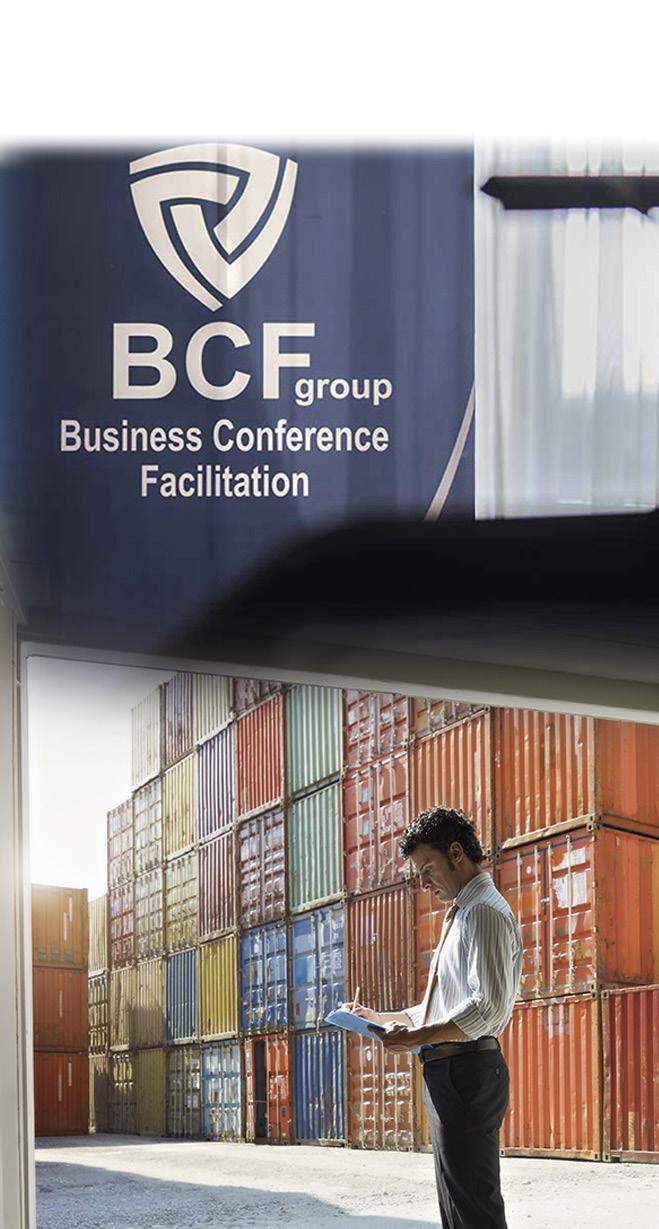
2-day conference with 100+ executives



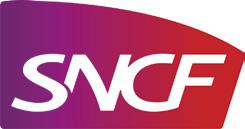



...from the entire supply chain world (from inbound logistics, to transportation, to warehouse operations & chips manufacturers) to help you thrive and explore best-in-class business strategies from the world’s largest brands & service providers.

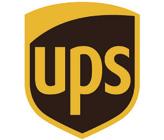





Previous attendees
10% DISCOUNT ON YOUR

Documented permission to pass that a national customs authority grants to imported/exported goods so that they can enter/leave the country.
Related topics
Bonded warehousing

Customs brokerage
Duties & taxes
Sponsored by
But leading customs expert tells The Freight Buyers’ Club podcast that countries wishing to attract more manufacturing must streamline trade bureaucracy.
China’s severe Covid lockdowns, ageing population, rising production costs and US tariffs on Chinese imports are also major push factors for manufacturers and retailers assessing their sourcing options.
Shifting geopolitical and demographic landscapes, not least uncertainty about China’s role as a reliable long-term manufacturer as tensions with the US escalate, will reshape trade and shipping flows over the rest of this decade.
This will create new opportunities for countries and companies in Asia, according to Neil Johnson, Co-Founder of customs firm TNETS which processes some $200bn of trade each year.
In the latest episode of The Freight Buyers’ Club podcast, produced with the support of the Dimerco Express Group, Johnson said his company was receiving enquiries every day from clients ‘looking to diversify the geography of their supply locations.’
At the same time, container lines, airlines and logistics providers were already preparing for this sourcing transformation by investing heavily across Asia. The carriers are coming, he said. We are seeing more investment in freight services and more investment in airlines around the region. I think, the physical part [of this procurement shift] is probably the easier part to deal with.
The sourcing shift is accelerating as China’s reliability as a long-term trade partner is questioned due to its closeness to Russia, its sabrerattling over Taiwan and rising tensions with the US. Drewry Maritime Research reported earlier this month that container shipping is ‘in the crosshairs of a superpower tussle that could divide the world and reshape trading networks.’
However, pull factors are also playing a role in this decoupling from China, a trend that will change container shipping and air cargo trade flows, according to Johnson. For example, the burgeoning middle classes emerging in countries with younger demographics than China are creating new markets as well as providing ready flows of labour.
In Indonesia the middle class is going to be huge, and they are going to have tremendous spending power, added Johnson. Indonesia is definitely going to benefit from China plus one, or plus two, or plus 12, strategies. But Indonesia needs additional investment in logistics. That has been forthcoming, but it has been forthcoming very, very slowly. There are new ports being built, airports are getting some investment, but it's still not going to be sufficient to meet the needs of that growing middle class. Indonesia is the largest economy in Southeast Asia and it’s going to benefit from decoupling [of manufacturing from China but] it needs more infrastructure and that's right across the archipelago.
Johnson said Bangladesh and Vietnam in Asia, and Mexico in the Americas, would also be beneficiaries of the shift of manufacturing from China. But all require improvements in their trade and customs processes, and logistics, shipping and air freight infrastructure.
Having government departments that have got the know-how to smooth the way for businesses to flourish, to issue licenses, to get out of the way when infrastructure and when money is made available rather than being a sort of unnecessary gatekeeper – those are critical things and, it's still something which is quite slow in coming around the region.

Speaking about the announcement of the new UK trade deal with the Comprehensive and Progressive Agreement for Trans-Pacific Partnership (CPTPP), Kate Jennings, Logistics UK’s Director of Policy said...
The UK’s accession to the CPTPP may only yield small benefits to the nation’s business in the short term, but the access to innovation and increased productivity which the deal will deliver longer term will be of benefit to the overall health of the UK economy. As a nation with longstanding and excellent trading links worldwide, UK PLC stands ready to benefit from the opportunities the new agreement will provide thanks to the country’s interconnected supply chain. The success of the agreement will stand on improved access to high growth markets including simplification of customs processes and future opportunities to digitise the movement of goods to speed connections between the UK and the 11 nations involved.
Speaking at the publication of the government’s consultation on its new Border Target Operating Model today (5 April 2023), Nichola Mallon, Head of Trade at Logistics UK said...
Our members share the government’s ambition to create the most effective border in the world, which facilitates trade to and from the EU. However, as always, the devil will be in the detail in the new proposals, and it is vital that the government
and business continue to test the model to ensure it is fit for purpose. Business will need as much time as possible to prepare for a new trading regime and Logistics UK will be keeping dialogue open with the Cabinet Office and HMRC during the consultation period to provide constructive feedback and shape the final outcome. Our members will be studying the proposals closely over the next six weeks to ensure the plans will enable logistics businesses to deliver for customers and the UK economy as a whole.


While terrorist attacks are the most sensational, customs fraud and smuggling (of drugs, weapons, luxuries, or even people) are significantly more common. Interpol reported seizing more than $700 million worth of drugs and associated contraband from around the globe in a single operation in 2022. Among the examples in early 2023, authorities in Qatar in February discovered 450+ narcotic pills concealed in a shipment of candies. And in March 2023, Australian Border Force arrested a man who attempted concealing cocaine in a shipment of water pumps. Smuggling is unlikely to stop anytime soon, so government agencies must shoulder the burden of finding ways to counter it. In many cases, they opt for saddling freight forwarders and other commercial logistics operators and couriers with some of that responsibility.
Increasingly sophisticated and automated threat-detection screening capabilities can help air freight operators satisfy new regulatory requirements and streamline operations and processes, says Astrophysics Inc.’s Donald Pyne


On the heels of major disruptions like the COVID-19 pandemic, breakdowns in international supply chains, and the war in Ukraine, the global air cargo industry entered a period of market correction in 2022. After an 8% drop last year, the International Air Transport Association (IATA) projects a shallower 4% decline in total cargo volume throughout 2023. Even so, the admittedly lower revenues should remain substantially higher than pre-pandemic levels. This moderate slowdown will present consumers with increased opportunity as freight forwarders compete for their shares of the remaining demand. Air cargo carriers looking to sustain profits from a more limited supply of available business must turn to increasing service quality and operational efficiency. Security is a crucial aspect of that endeavor.
With agencies like the US Transport Security Administration (TSA) requiring that 100% of cargo transported on passenger aircraft undergo security screening for explosives and other threats, screening obligations are nothing new to the air cargo sphere. However, as threats and concealment methods evolve, stricter regulatory requirements march on in lock-step with advancing technologies to stay ahead. 2023 will see jurisdictions like the European Union (EU), United Arab Emirates (UAE), United Kingdom (UK), and Canada implementing the next phases of their local cargo screening plans. TSA’s 2021 air cargo security roadmap is also reaching its end-stages, with objectives like risk data-based screening, enhanced information sharing, and technology upgrades featuring implementation targets spanning 2022-2024. As screening obligations intensify, freight forwarders and other air logistics stakeholders must find ways to sustain competitive delivery times without compromising security.
As with any evolving demand, adaptation and innovation are never far behind. For example, the Astrophysics Multi-View CT™ 450 kV shortens per-pallet screening times by scanning whole pallets without needing to break-bulk. With 35 distinct X-ray views and a detailed 3D CT model, analysts can find threats hidden practically anywhere in a pallet. Other novel approaches – within Astrophysics products and in the wider industry – include enhanced automatic detection, such as Artificial Intelligence (AI)-based detection of Lithium-ion batteries.
Which can otherwise be especially dangerous aboard airplanes. These types of solutions both strengthen overall security and streamline screening processes to save time and money getting important goods from origin to destination.
In the perpetual arms race between legal authorities and criminal elements, it pays to stay ahead of the curve. Earlier access to advanced technology can ensure freight forwarders are well-positioned to
satisfy new regulatory requirements before they take effect, cement operator experience with modified procedures and protocols, and of course yields practical benefits applicable to the specific technology. With greater familiarity comes higher efficiency, and in turn improved reliability. In a slowing market, fast and reliable air freight and logistics operators will find themselves with a strong competitive edge.
Inc.
 Donald Pyne, Senior Product Manager, cargo security technology specialist Astrophysics
Donald Pyne, Senior Product Manager, cargo security technology specialist Astrophysics
New Pre-Loading Advance Cargo Information (PLACI) requirements for aviation security purposes are coming into force in different nations this year. Freight forwarders need to prepare and adapt their business and operational processes to be compliant with stricter customs policies, FIATA highlights
To address security threats arising around the world, the World Customs Organization (WCO) and International Civil Aviation Organization (ICAO) have come together to introduce ‘Pre-Loading Advance Cargo Information’ (PLACI) guidelines to prevent future ‘bomb in the box’ scenarios as an extension to the Advanced Cargo Information (ACI) regime. This was given an added impetus by the transatlantic aircraft bomb terrorist incident in October 2010, when Improvised Explosive Devices (IEDs) were concealed in computer printer cartridges and placed on a cargo aircraft.
The US has already successfully established the Air Cargo Advance Screening (ACAS) regime, and now other nations are joining the US in adopting enhanced customs procedures at their territories. The European Union (EU), the United Arab Emirates (UAE), the United Kingdom, and Canada are developing stricter customs policies, some of which will be effective from this year onwards.
1 EU – ICS2
The Import Control system (ICS), a pre-arrival security programme established by the EU in 2011, is being gradually replaced with a new customs pre-arrival security and safety programme called Import Control System 2 (ICS2). This new system will allow for the implementation of the new Union Customs Code (UCC) processes and procedures relating to the entry or transit of goods to/through the EU including Switzerland, Norway and Northern Ireland. For the first time, it will introduce the option of multiple filing, providing freight forwarders with the possibility of filing house level data themselves, without disclosing such data to the carrier.
The ICS2 Transition Plan foresees implementation in three operational releases. Release 1 has been effective since 15 March 2021 and involved postal operators and express carriers only. Release 2 will go live on 1 March 2023 and will be relevant to freight forwarders, who are new actors to this regulation, all postal operators, express and air carriers. Release 3 will take effect as of 1 March, 2024 and will impact maritime, road, and rail modes of transport.
If you are a freight forwarder, submitting data to ICS2 is an opportunity, but also a challenge. First of all, freight forwarders will need to decide when to:
• File the pre-loading and pre-arrival data directly with the customs authority themselves
• Make the necessary commercial documentation data (i.e., house level transport contract) available to your air carriers in advance, for them to file the necessary information to ICS2 within the legal time limit. The required data set, inter alia, encompasses a description of each article and corresponding six-digit HS code shipped under said HAWB.
Freight forwarders sending goods to or through the EU, Switzerland, Norway and Northern Ireland, and wishing to self-file themselves, need to get in touch with their air carriers and make the necessary contractual arrangements to carry out ICS2 data reporting requirements.
ICS2 regulations are new to all companies, and freight forwarders need to start their preparations in time, especially since new systems and procedures need to be implemented or adjusted.
Recently, the EU Directorate-General Taxation and Customs Union (TAXUD) provided a clarification on the phased deployment windows of ICS2 Release 2 for cargo transported by air:
• 1 March – 30 June 2023: Deployment for air carriers for the master level of filing (MAWB)
• 1 July – 2 October 2023: Deployment for self-filers, i.e. the freight forwarders who would choose to file house level (HAWB) themselves
FIATA is working actively to support its members on the implementation of self-filing with the support of the CAI-ABSS taskforce on Advanced Cargo Information. FIATA is also working on the development of FAQs on ICS2 for freight forwarders, which are expected to be published by the end of the year.
The National Advance Information Center ‘NAIC’ is a UAE government body aiming to increase national security by obtaining advance information on cargo, and started developing its programme in 2020. Since ACI programmes are already implemented, they currently focus on the implementation of PLACI. Currently, release one of PLACI is completed and release two, which will include testing of all operational scenarios, will be launched in 2023.
The United Kingdom adopted the Pre-Loading Data Informed Cargo Target (PreDICT) Programme, which was projected before Brexit and is using a similar format to the EU’s ICS2 system. The programme has been released in 4 stages, and instigating initial data provider connections are now being introduced to the system. Until now, participating in the four stages of the program has been voluntary, however, by the end of 2023, the participation in PReDICT will likely be mandatory.
Canada has been involved in the PLACI initiative ever since WCO ICAO guidance was issued. It is currently in the pilot phase of its new regulatory security scheme, the Pre-Loading Air Cargo Targeting (PACT), for air freight filing. An initiative is operated by Transport Canada (TC) to identify and mitigate risks to aviation, the pilot project of which is currently ongoing and is expected to be mandated by the end of 2023.
The draft legislation is expected to become available by the end of this year with a 75-day comment period. The deployment window is expected to be from Spring 2023 until autumn/winter 2023. Transport Canada has noted that the codes and messages will be almost identical to ones used for the US ACAS. The PLACI programmes in Canada, the UK and the UAE do not currently allow for self-filing, which may be considered in the future. FIATA is closely following the development of these new regulations and supporting its members with the support of the CAI-ABSS taskforce on Advanced Cargo Information and input from the other transport modes as relevant.
Published courtesy of FIATA. This briefing was originally published in the FIATA Review, which presents a global outlook on transport and logistics developments, as well as the latest news from the FIATA secretariat and its members.






Organisations and bodies that provide essential support to the freight and logistics industries.

Related topics
Warehousing
Insurance & legal
Vehicles & equipment
Sponsored by

Digital insurance innovator Breeze has launched an online platform specifically designed and built for forwarders and logistics companies that provides instant, all-risk, shippers’ interest cargo cover.
The fully automated platform is free-to-use and can be fully embedded in existing operational workflows within minutes.
An estimated 70% of global trade is either un-or-under insured, with shippers often unaware they are not covered by their forwarder or logistical partner when moving their cargo. With the growing number of risks affecting supply chains, it is more important than ever that cargo is properly covered. Built solely around the freight industry, our platform is simple and user-friendly, powered by cutting-edge technology and Artificial Intelligence (AI).
Matthew Phillips, Chief Commercial Officer, Breeze.The Breeze platform can also analyse and present to the forwarder their overall risk profile, including, for example, exposure to unsafe vessels, ports and commodities, allowing for constant operational improvements and better risk management.
This is done by analysing the data of each forwarder and extracting the relevant risk insights, allowing forwarders and logistics companies to constantly improve their operations by making them safer and more sustainable.
Since launching, Breeze has already onboarded many market-leading forwarders such as ICL UK, a growing UK forwarder that specialises in all modes of transportation, with a very big business for perishable items.
Breeze made it very easy for us to offer cargo insurance with minimal effort from our side. The Breeze team is always available, always thinking about new ways to improve and we see them as a real extension of our operations. It’s rare to see a player in our industry that solely cares about making our life easier and our customers happier.
Yoav Izhari, Chief Executive Officer, ICL UKBreeze was set up in 2021 by an executive team with extensive experience in the fields of data, engineering, risk management, commercial underwriting, and insurance.

Breeze has successfully rolled out its insurance solution in the UK market and is now set on expansion in the Americas, with its first US office opening earlier this year.
Breeze has also recently appointed industry veteran Patrizia Kern as Chief Insurance Officer.
Bringing 30 years’ experience of cargo insurance management to Breeze, Kern most recently led Swiss Re Corporate Solutions’ global marine division, where she headed up the cargo and hull business.

Having worked as freight forwarding agents, we know that cargo insurance is often missed due to it not being proactively offered to shippers when they book their shipments. This is mainly because forwarders and logistics companies lack the right tools and training. Breeze’s platform allows forwarders to provide a better service to their customers, through seamlessly offering cargo coverage in an integrated, automated, and embedded way, which in turn will generate additional revenues. This is what we do, and the only thing we do – allowing forwarders and logistics companies to focus on powering the global supply chain, while leaving everything insurance related to us.
Eyal Goldberg, Chief Executive Officer, Breeze.P4D, UK-based experts in digital freight forwarding, have partnered with Kriya to offer their customers up to £100,000 in credit to keep the haulage business moving.
Digital freight forwarder P4D has partnered with Kriya, a revolving credit facility, to allow its customers to purchase road, sea and air freight services online without needing to pay upfront. Kriya’s buy now pay up to 60 days later option, offers a flexible solution for businesses looking to book freight services in the UK. Forms of credit like this being readily available make it possible for customers to get supplies in or goods out while keeping funds readily available and without damaging their credit.
During recent years, Brexit and more recently the Covid-19 pandemic have had significant impacts on the supply chain. Simple ways of receiving credit that ease cash flow, such as buy now pay later, can really help. Credit facilities like Kriya offer a free and straightforward way to ease that burden.
Credit facilities are a cost-effective way to manage cash flow. Ordinarily, a business would only pay interest on the amount borrowed. This is more cost-effective than using a business credit card or other shortterm financing options. However, with Kriya, P4D has launched an interest-free solution akin to other consumer products within the E-Commerce space. Each repayment helps improve your business's credit score, as long as you make payments on time.
In order to progress, an applicant needs to submit some basic company information, so they can start with a soft credit check. This determines your eligibility by looking at your financial history. The soft check doesn’t affect your credit score and is generally used to make sure your business is in good standing before they lend you any money.
Once your business passes the initial credit check and is approved, there will be a one-time hard search before your first purchase. This will appear on your credit score, but it’s unlikely to affect it as it only happens once. Then you’re ready to go! In addition, over time, after a few successful repayments, the amount you are eligible for will increase.
Revolving credit has become especially helpful in recent years. Rising fuel and transportation-related costs as well as capacity constraints in the number of available ships and trucks have combined to create a challenging environment for shippers and carriers, which has driven up freight shipping costs.
Let's say there's a retailer based in the United Kingdom who wants to import goods from China by sea. Shipping costs for a large shipment can be expensive and take up to 8 weeks for delivery. This can cause significant strain on the retailer's cash flow. However, accessing a ‘buy now pay later’ option allows them to defer payment for the shipping fees until a later date. By using this option, the retailer can make the necessary payments for their imported goods and not have to worry about paying for the shipping fees upfront.
This can free up cash flow and allow the retailer to invest in other areas of their business, such as allowing them to make larger orders and take advantage of bulk discounts – helping them save money and improve their profit margins. Furthermore, the retailer can plan their finances better as they know they will have to pay for shipping costs at a later date and can adjust their budgets accordingly. This can provide the retailer with more financial flexibility and stability in the long run.
As more businesses seek viable alternatives during the cost of living crisis, P4D wants to offer solutions to help them get their supplies when they need them most.




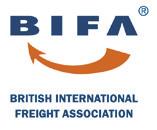
























Between economic boom and normalization: Dachser generates an additional billion EUR in revenue and plans investments of over EUR 300 million
For the 2022 financial year, logistics provider Dachser reports revenue of EUR 8.1 billion (+14.9 percent), marking the second consecutive year of double-digit growth.
A high level of logistics expertise, reliability, and the quality of services were the foundations for Dachser’s success last year. We’re about to break into a new league, said Burkhard Eling, CEO of Dachser, at the company’s annual press conference in Munich. Our customers appreciate the resilience we bring to their supply chains and reward this service. Today, Dachser is increasingly being perceived as the partner for globally interconnected solutions and a consultant for optimized supply chains.
In addition, the main drivers of this growth were disruption-prone supply chains and scarce capacity, which led to high price levels in the market. Starting in September 2022, the economic boom in logistics transitioned to a clear normalization of business with declining shipment numbers and rates, especially in air and sea freight. Over the year as a whole, Dachser transported 81.1 million shipments (−2.9 percent) weighing the same as last year: 42.8 million metric tons.
Dachser’s Road Logistics business field—which comprises the transport and warehousing of industrial and consumer goods (European Logistics) and food (Food Logistics)—increased its revenue by 14.2 percent to EUR 5.7 billion in 2022. Transported tonnage rose slightly by
0.4 percent, while the number of shipments fell by 2.8 percent in an environment of high fuel and energy prices and growing consumer restraint.
The European Logistics business line increased its revenue by 13.4 percent, growing at roughly the same rate as it did in 2021. In contrast, the number of shipments fell by 3.5 percent. Tonnage held constant at 30.0 million. The Food Logistics business line saw major growth in 2022, with revenue increasing by 17.1 percent. As a catch-up effect after coronavirus-related restrictions had been lifted, there were slight increases in both shipments (+1.8 percent) and tonnage (+1.1 percent) in this business line. Dachser Food Logistics generated revenue of EUR 1.3 billion in the past financial year and thus remains a stable and reliable pillar of the business model.
Following the exceptional revenue growth in 2021, last year’s greater capacity in air and sea freight and the sputtering growth in China ensured that growth in the Air and Sea Logistics business field settled at a lower level. Here, Dachser closed out the year with a 16.7 percent increase in revenue from EUR 2.1 billion to 2.4 billion, even as the number of shipments fell by a total of 7.3 percent.
During the coronavirus pandemic, our air and sea freight business raised its profile significantly. Contributing factors were the expansion of the LCL groupage business in sea freight and the air freight charter network, which operated 260 flights last year alone. Our customers appreciate how deeply integrated our services are—on land, at sea, and in the air. We will strengthen this USP even further in the future.
Business with contract logistics—the intelligent combination of warehousing, value-added services, and transport—developed very positively. In 2022, Dachser offered its contract logistics customers 2.7 million pallet spaces, around 152,000 more than in the previous year. The company currently has 163 warehouse locations on four continents, with plans to add 14 more facilities in 2023.
The workforce grew in 2022 by around 1,100 people to a total of 32,850. Its high equity ratio of more than 60 percent enables Dachser to continue investing significantly in digitalization, climate action, its employees, and the expansion of its network, even when economic times are tough.
Eling stated the company will continue on its chosen course in 2023 and announced that, following the EUR 196 million it invested in 2022, it plans to invest over EUR 300 million in 2023. Dachser has already started the new year with the acquisition of the Dutch food logistics company Müller and the air and sea freight forwarder ACA International, which is based in Melbourne, Australia.
company Müller and the air and sea freight forwarder ACA International, whic h is based in Melbourne, Australia.
The year has gotten off to a cautious start with comparatively low transport volumes, but Dachser sees no cause for concern.
The year has gotten off to a cautious start with comparatively low transport volumes, but Dachser sees no cause for concern. “We expect that after two years of exceptional revenue growth, but also exceptional burdens on the operational teams, 2023 will now see a return to a bit of normality in logistics and in our business,” Eling said in Munich.
We expect that after two years of exceptional revenue growth, but also exceptional burdens on the operational teams, 2023 will now see a return to a bit of normality in logistics and in our business, Eling said in Munich.
“Con-Tra America Corp’s philosophy is based on teamwork, responsibility, and mutual support. We encourage partnerships and prioritize operating in an environment that encourages creativity, diversity, growth, and performance. Our main purpose is to meet and exceed our customers’ expectations. Without them we would not exist, so we are always driven to constantly look for ways to keep up to date with the latest technologies, improving processes while increasing quality of the service, and understanding and working with the everchanging market. The Company strives to implement a prompt operating environment. Working closely with suppliers, U.S.-based shipping lines, distributors, trackers, custom brokers, and warehouses to coordinate and schedule shipments ensuring all customer’s goods are always delivered efficiently and in a timely manner.”
Dachser, a family-owned company headquartered in Kempten, Germany, provides transport logistics, warehousing, and customized services in two business fields: Dachser Air & Sea Logistics and Dachser Road Logistics. The latter consists of two business lines: Dachse r European Logistics and Dachser Food Logistics. Comprehensive contract logistics services and industry-specific solutions round out the company’s range. A seamless shipping network both in Europe and overseas and fully integrated IT systems ensure intelli gent logistics solutions worldwide.
Thanks to some 32,850 employees at 379 locations all over the globe, Dachser generated consolidated net revenue of approximately EUR 8.1 billion in 2022. The same year, the logistics provider handled a total of 81.1 million shipments weighing 42.8 million metric tons. Own
Con-Tra America Corp is an established freight forwarding, logistics, and consulting company. With offices in Salerno, Italy, and London, UK we can offer competitive warehousing within Great Britain and Italy, as well as ocean transport to and from North West Europe and the US. With an unmatched level of service, expansive industry experience, and superior work ethic, Con-Tra America Corp is your one-stop shop for all your shipping and logistics needs.
Con-Tra America Corp offers a broad range of services that are tailor-made to fit each customer’s needs. Working closely with our trusted partners, we are your one-stop shop for all your shipping and logistics needs.
- International & Domestic transport via air, land, and sea

- Import & Export consultation
- Custom Brokerage
- Warehousing & Logistics solutions
- Cargo Liability Insurance

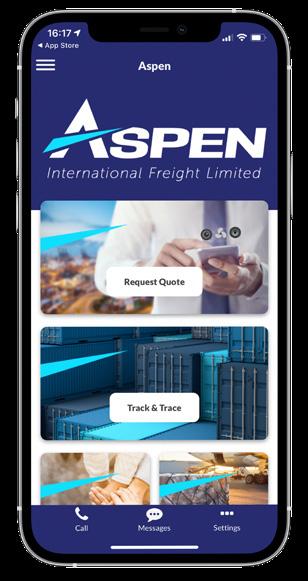
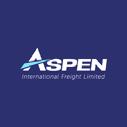














From money woes to monkeypox, from climate change to COVID, there's usually something going on that needs close monitoring. Here we'll report your stories about emergency management.

Related topics
COVID-19 Brexit Global warming
Europa Road is strengthening its German services, announcing a new partnership with leading operator Noerpel

The new partnership with Noerpel supports Europa’s continued ambition to reduce export and import lead times for customers shipping to and from the South of Germany.
Working with Ulm based Noerpel, enables Europa to provide an additional route, boosting its services with a new daily round trip connection to the South of Germany. It will add further capacity for predicted growth throughout 2023.
Europa Road is the dedicated european road freight division of fast growing logsitics operator Europa Worldwide Group,
The additional German service routes to Europa’s purpose-built transit hub in Dartford (the largest of its kind in the UK) which already provides more than 30 daily groupage services between the UK and the Continent.
Known as the ‘1Hub,’ this £30m state-of-the-art groupage depot is located close to the Dartford Crossing and has seen a 15 per cent increase in volume year on year. Today a record 40,000 consignments per month pass through the terminal seamlessly, thanks to the unique addition of Europa Flow, the firm’s (DDP) frictionless customs service which optimises the movement of goods to and from the EU post-Brexit.
Noerpel is a well-established, independent forwarding company with several platforms in the South of Germany. Similarly to Europa, Noerpel has a dedication to European road freight and focus on innovative business processes so offer the perfect partner to boost our presence and reach in Germany. Noerpel stood out to us as a new German partner as their prime location allows us to transport directly between Ulm and our 1Hub facility within 24 hours, offering another seamless European road freight solution. This new partnership offers a more local service driving down distribution rates to local postcodes.
Dan Cook, Operations Director, Europa Worldwide GroupWe welcome this new partnership which will enable us to strengthen the markets between the UK and Germany in terms of safety, lead times, sustainability, and expertise.
Andreas Scholten, Operations Director, NoerpelAfter showing tentative signs of stabilising in February and March, early April showed the steepest week-on-week tonnage drop since the Lunar New Year factory closures in January, figures from WorldACD indicate
The global air cargo market has slipped further into decline after showing tentative signs of stabilising in February and March, with the first full week of April showing the steepest weekon-week drop since the Lunar New Year factory closures in January, preliminary figures from WorldACD Market Data indicate.
Following small week-on-week declines in weeks 12 (-2%) and 13 (-3%), week 14 saw a fall of 8% in worldwide flown tonnages, plus a further slight (-3%) drop in average global air cargo pricing – based on the more than 400,000 weekly transactions covered by WorldACD’s data. Comparing weeks 13 and 14 with the preceding two weeks (2Wo2W) shows a similar result, with overall tonnages down by 8% versus their combined total in weeks 11 and 12, and average worldwide rates decreased by 3%, with capacity more or less stable.
Although average air freight yields and total revenues remain high by historic standards, overall global tonnages have dropped back to around their levels in 2015 and 2016. Freight forwarding and shipper reports suggest that this may partly reflect an adjustment of inventory levels following restocking that took place in early 2022 in response to congestion and anticipated congestion in ocean freight supply chains.
Various sources believe the current relatively subdued demand will continue during the first half of this year, and that demand levels may pick up in the second half of 2023, as inventory levels drop. However, some shippers say the current demand slump is now less about high inventories and more about low confidence among retailers and other cargo owners about demand this year from their customers, causing to a return to more just-in-time supply models for some companies.
Meanwhile, at a regional level, the downward trend in air cargo tonnages is visible from all of the main origin regions and on almost all lanes, on a 2Wo2W basis, particularly flows ex-Middle East & South Asia to Asia Pacific (-15%), ex-North America to Europe and to Central & South America (-12%), and flows ex-Europe to Asia Pacific, Central & South America and to Middle East & South Asia (-10%). Demand on the big lanes from Asia Pacific to North America and Europe also showed a significant decline (-11% and -5%, respectively), with only one regional lane showing a slight increase: Middle East & South Asia to Europe (+1%), according to WorldACD’s data.
In terms of pricing, on a 2Wo2W basis average yields continue to show a stable trend ex-Central & South America, but for all other regions average rates are decreasing, with the most significant drop seen from the Middle East & South Asia to Asia Pacific (-18%).
Comparing the overall global market with this time last year, chargeable weight in weeks 13 and 14 was down 11% compared with the equivalent period last year – a return (after March’s -8%) to the double-digit percentage declines seen in the preceding five months. Notable percentage decreases in tonnages year-on-year were ex-North America (-27%), ex-Europe (-10%), ex-Middle East & South Asia (-10%).

Past 5 weeks
Also ex-Asia Pacific the trend compared to last year was negative (-6%), despite recent relatively positive developments from that region.
Overall capacity has jumped by +12% compared with the previous year, with double-digit percentage increases from almost all regions – except from Central & South America, which was slightly down (-1%), and North America (+6%). Most-notable increases were ex-Asia Pacific (+28%), ex-Africa (+19%) and ex-Europe (+15%).
Worldwide rates are currently -35% below their levels this time last year, at an average of US$2.62 per kilo in week 14, despite the effects of higher fuel surcharges, although they remain around 50% above pre-Covid levels. Initial WorldACD figures indicate that first quarter (Q1) 2023 is looking at a 11% YoY drop in tonnages, compared with -13% for Q4 2022.

Despite softening in the last 12 months from the exceptionally high demand and pricing levels the previous year, the international air cargo market remains relatively strong in historical terms, with early 2023 worldwide revenues still the third-highest achieved in the last 15 years, figures and analysis from WorldACD reveal.
Analysis of the world’s main sub-regions and specialist product categories also highlights some further positive indicators, including 14 of the 23 subregions identified by WorldACD experiencing positive revenue growth last year compared with the overall record figures of 2021. It also reveals continued revenue growth within air cargo specialist products including temperature-controlled/pharma, dangerous goods, flowers, meat, and live animal shipments, with specialist products continuing to grow in importance and in revenue terms for carriers and the wider air freight sector.
Will Waters, contributing editor,


Organisations and bodies that provide and train staff for the freight and logistics industries.
Related topics
Certification
Organic growth
Safety awareness
Sponsored by
As part of a strategy to enhance engagement and further raise its profile with its members, the British International Freight Association (BIFA) has appointed Denise Hill as member engagement director.

With a strong background in commercial and relationship management, Denise will oversee and develop BIFA’s interaction with its membership in regards to the services it provides and how they are delivered.
For much of the past decade, Denise has worked for DHL Global Forwarding and was involved in Customs brokerage account management and related activities, building strong relationships to progress account growth for multinational clients.
Most recently, she set up and implemented a new team to manage Brexit-related Customs activities for the company’s clients from the automotive sector.
Denise is a graduate with a degree in European Business Studies and completed an MBA in 2015.
The newly created role is designed to strengthen and support our engagement with our members; and ensure that their views reach all areas of the association; and are reflected in the work undertaken by the secretariat. Denise comes to us with extensive customer engagement skills, and I am confident that she has the ability to engage with our members to get a better understanding of how BIFA can fulfil their requirements. The appointment is part of broader strengthening of BIFA’s regional representation across the UK, which is currently administered by a team of long-standing regional representatives and consultants.
Steve Parker, Director General, BIFAAttracting and maintaining a roster of talented drivers in the specialist fine art logistics industry has always been a challenge, but many agents within our global membership of 79 shippers have been experiencing clear shortages in recent years. These have been felt most acutely by shippers in the UK, Europe, North America, Australia and parts of Southeast Asia.
Our sector employs drivers with specialist handling skills, where the driver can both transport and install for a client. Member agents either employ individuals with a background in art and train them as drivers or employ experienced drivers and provide them with art-based training. In recent years we have seen less individuals with art-backgrounds interested in art handling as a career and less drivers considering a specialist role, where there may be more initially attractive generalist opportunities elsewhere.
On the other hand, hiring from a pool of professional lorry drivers rarely works out, says David Preston of London-based ICEFAT member Crown Fine Arts. They’re often not interested in the non-driving aspects of the assignment. So, we look for candidates who are able to handle artwork, understand it, install it, pack it and drive a heavy goods vehicle. Reliable, respectable, client-facing, who don’t mind a long day. (Meet ‘Neil Delinahaystack’). We discussed blending these demographics, cross-pollinating from graduates of art schools and career drivers, hoping that a hybrid arises. Sometimes it’s necessary.

Fresh approaches to employee welfare, including good compensation and benefits, are having a positive effect on the shortage of drivers, which is not as acute as it was a year ago, says International Convention of Exhibition and Fine Art Transporters (ICEFAT) chairman Jonathan Schwartz
At our 2022 Convention we conducted a panel on driver recruitment and retention issues. Representatives from Singapore, USA, UK, Europe and Australia reported on the unprecedented levels of staff turnover they were experiencing. ICEFAT members from Italy and Australia noted a trend that new employees are often trained but then leave before this investment by the company pays its dividends.


Our Convention panel agreed that the solution is to put welfare at the heart of our approach. One colleague in the sector, Oliver Howell of UK-based ICEFAT agent Gander & White Shipping, noted what had succeeded in his company’s case, telling me: What keeps our drivers motivated is variation. They are not just drivers but art technicians, installers. We don’t just send them constantly from A to B doing the same routes, we give them time away from the vehicles to undertake different projects. I can attest to this benefit having started my own career as an art handler and cross-country driver.
Perhaps the most powerful industry initiative for driver retention is our recently codified ICEFAT Standards to which all our membership must adhere. This includes recruitment and employee welfare, going beyond only considering the quality of service and facilities. All ICEFAT members will be assessed against these Standards by an independent auditor, ensuring each agent is an industry leader in service quality, security, safety and training. By protecting employee welfare as part of our Standards, we are aspiring to make our sector one of the most attractive places to work within the entire freight industry.

Our membership’s approaches to employee welfare, including good compensation and benefits, are having a positive effect on the shortage of drivers in our industry, and thankfully the issue is not as acute for most of us as it was a year ago. With approaches tested by our agents and the introduction of our ICEFAT Standards, we want to ensure that drivers are not only attracted to work for a specialist fine art shipper but will stay with us too.




























WELCOMING
TO
HILLEBRAND GORI
DOMINIQUE VON ORELLI C.E.O.
IN THE POSITION OF DOMINIQUE VON ORELLI APPOINTED C.E.O. OF HILLEBRAND GORI – A DHL COMPANY
Casper Ellerbaek will succeed Dominique von Orelli as the new Head of Global Ocean Freight, effective 1 September.
Bonn, April 6, 2023: DHL Global Forwarding, the air and ocean freight specialist of Deutsche Post DHL Group and Hillebrand Gori – a DHL company, announce that, Dominique von Orelli has taken over as CEO Hillebrand Gori with immediate effect.
DHL is the leading global brand in the logistics industry. Our DHL divisions offer an unrivalled portfolio of logistics services ranging from national and international parcel delivery, e-commerce shipping and fulfillment solutions, international express, road, air and ocean transport to industrial supply chain management. With about 395,000 employees in more than 220 countries and territories worldwide, DHL connects people and businesses securely and reliably, enabling global sustainable trade flows. With specialized solutions for growth markets and industries including technology, life sciences and healthcare, engineering, manufacturing & energy, automobility and retail, DHL is decisively positioned as ‘The logistics company for the world.’
He succeeds Tim Scharwath, CEO DHL Global Forwarding, Freight, who in a dual function has led and successfully driven the integration of Hillebrand Gori since the acquisition in March 2022. Von Orelli will continue to report to Tim Scharwath and will maintain responsibility for Ocean Freight in the coming months in addition to his new role.

In almost four decades with DHL, Dominique has been instrumental in positioning Ocean Freight as a strong core product within DHL Global Forwarding and a leader in the industry. With his excellent business knowledge, Dominique has also played an important role in the acquisition and integration of Hillebrand. Under his leadership Hillebrand Gori will reach new heights and strengths as an expert in the logistics of beverages, beer, wine and spirits.
Tim Scharwath, CEO, DHL Global Forwarding, FreightAs of 1 September, Casper Ellerbaek, will join DHL Global Forwarding, succeeding von Orelli as the new Global Head of Ocean Freight. Ellerbaek, who will also report to Tim Scharwath, comes with an extensive network in the international logistics industry, which he has built up in various management positions in Canada, Europe, the Middle East and over the last 12 years in Asia.
With Casper Ellerbaek, we have found an experienced leader with vast knowledge and great leadership skills to succeed Dominique. I am confident, that he will continue the successful course Dominique has set for Ocean Freight at DHL Global Forwarding.


XPO, a leading provider of innovative transport and logistics solutions in Europe, has announced the appointment of Emmanuel Arnaud as operations director – Europe, effective immediately. He reports to Luis Gomez, XPO’s president – Europe, and will serve on the executive board of the European business.
Arnaud is a high-impact transport and logistics executive with more than two decades of success leading initiatives for operational excellence, technological innovation and sustainability. Prior to XPO, he held senior positions during 18 years with GEFCO, most recently as divisional CEO with responsibility for road, air and sea freight, and customs and logistics operations. In earlier management roles, he established a customer-centric culture that aligned GEFCO’s sales and marketing operations in 40 countries and developed blue chip account relationships.
Luis Gomez said: Emmanuel is a tremendous asset to our European business and joins us at a time when we are unlocking potential across a wide range of verticals. His deep understanding of the connections among operations, sales and customer service will be invaluable in implementing our end-to-end solutions. I look forward to working closely with Emmanuel as we continue to execute our growth strategy.
Arnaud began his career in France with Groupe Giraud, and then served as general manager of TNT Logistics entities, providing just-in-time supply management for the fast-moving consumer goods (FMCG) and automotive sectors. He holds a master’s degree in corporate finance from Institut Mines-Télécom Business School and a bachelor’s degree in law from Université d’Évry.
XPO’s innovative service offerings include technologyenabled truckload, less-than-truckload, truck brokerage, managed transport, last mile and freight forwarding. The company tailors its solutions to customer-specific needs across a range of consumer, trade and industrial sectors and world-class events.
XPO (NYSE: XPO) is one of the largest providers of asset-based less-than-truckload (LTL) transportation in North America, with proprietary technology that moves goods efficiently through its network. Together with its business in Europe, XPO serves approximately 48,000 customers with 554 locations and 38,000 employees. The company is headquartered in Greenwich, Conn., USA. Visit xpo.com and europe.xpo.com for more information, and connect with XPO on Facebook, Twitter, LinkedIn, Instagram and YouTube.
CUSTOMER SOLUTIONS & DEVELOPMENT MANAGER

KERRY LOGISTICS
To work directly for your Branch to grow the Client portfolios and develop business, be it existing or new. You will not only have the support of the Branch Managers as a Direct report but indirectly with the Customer Service Team nationally to expand the brand of Kerry Logistics’ to a UK Customer base through effective Account Management and New business acquisition with target bonuses on KPI (non-commission role)
Develop a thorough knowledge of our products & services to ensure that our client base is fully aware of all the KLUKs capabilities and identify upselling opportunities.
You must demonstrate the KL ‘Voice’ Values and Objectives in your day-to-day role
• Development of New business Communication with customers on the telephone (training and messaging will be provided)
• Profiling and understanding new & existing customer base identifying future opportunities with a view to upselling wider Kerry Logistics services
• Setting appointments for Branch/ Commercial Managers where appropriate
• Joint visits to customers with Branch/ Commercial Managers where appropriate
• Record Management: Ensuring that all data recorded in Zoho CRM system is entered correctly, progressed appropriately and maintained, including updating contact information in line with GDPR
• Data Analysis / Quality Check: Undertake a full analysis of the data in the Zoho CRM system to ensure that it is quantified and
supports both the Sales, Marketing and Customer Service function.
• Support the transition of new business into the organisation by ensuring that the New Customer Reports (NCR’s) are completed correctly, understood by Operations, and that appropriate SOP’s have been put in place.
• Responding to returned client enquiries with email campaigns.
• Minimum 50 qualified telephone calls per week to profile new, existing and lapsed customers
• Minimum of 4 discovery meetings per week on Teams or Face to Face with new, existing and lapsed customers ensuring criteria set out in the UK Sales Accountability Process is met
• Attend 1–2 meetings per month (minimum) in collaboration with UK Branch/ Commercial Manager in order to develop an understanding of the wider sell and understand more about Kerry Logistics full product offering.
• Strong organisation skills with an ability to multi-task
• Confident and professional communicator
• Ability to work collaboratively and build strong relationships both internally and externally.
• Proficiency in all aspects of Microsoft Office (Excel and Powerpoint, in particular)
You’ll be an independent and clear thinker, possess a keen eye for detail, have confidence when communicating and instinctively know if something looks good. Additionally, you will be able to demonstrate an empathy and understanding towards the customer.

BRADFORD, GLASGOW, HEATHROW, DARTFORD (UK)
To assist in the delivery of the UK Commercial Strategy by converting business opportunities into new customers.
• Working within the Branch to support the development and growth of Kerry Logistics’ UK Customer base through effective Account Management.
• Generating New Business: Creating and implementing an annual business plan to achieve your set target be it revenue or volume driven. This will include identification of target markets and prospects customers to secure new business.
• Develop a thorough knowledge of Kerry products & services to ensure that our client base is fully aware of all the KLUKs capabilities and identify upselling opportunities.
• Process: Adhering to the UK Sales Accountability Process which sets out the process for prospecting management and customer follow-up to ensure that all potential customers are handled in a manner conducive to maximizing the company’s goals for sales penetration, profitability and customer loyalty.
• New Customer Transition: Once a client has been successfully gained it is the responsibility of the Commercial Manager to ensure that a New Customer Report (NCR)or SOP is completed outlining all of the customer’s key requirements as well as services and prices.
• Quotations and Negotiation: Quotations should be created in line with company policy using standard templates issued.
Any negotiation from the price submitted should be approved by procurement and/or Branch Manager.
• Record Management: Ensure that all data recorded in the Zoho CRM system is entered correctly, progressed appropriately and maintained in accordance with EU CRM Guidelines.
• Knowledge and Information: Ensure that you are up to date with the latest developments across the Kerry Logistics Product offering, utilising the KLN Portal and Kerry Academy.
• Weekly meetings with Branch Managers to discuss Commercial growth and Strategy for the branch.
• Various reports are created weekly and monthly by Zoho CRM so it is imperative that your activity is kept up to date and is accurate.
• New Business Report: Should be completed monthly within set timeframe to allow commission payments to be calculated accordingly.
• Targets (Guideline)
• Weekly: Attend a minimum of 10 new / existing business meetings per week.
• Monthly: Convert 5 new business opportunities. Add 10 new quality opportunities to your pipeline.
• Portfolio Growth: Increase the portfolio YOY.
• Annual: GP contribution to be agreed on an individual basis.
• Targets will be reviewed monthly
Please contact Louis at louis@headfordgroup.com
LIVERPOOL, UK
SALARY: £30,000–£40,000 | Ref. MMFF40
• Working with a globally recognised freight forwarder
• Experience in processing VGM’s and import/export Customs declarations using CNS, Destin8, Descartes software and a working knowledge of CDS
• Arranging courier, specialist hand carry services, FCL, LCL, consolidations, conventional shipments, air freight, air sea charters, packing etc.
• Develop and maintain relationships with suppliers and both internal and external customers. Provide customers with accurate updates and deal with any customer queries/ complaints that may arise quickly and efficiently

• Negotiating rates for transportation, shipping and handling costs thereby quoting clients
COLNBROOK, UK
• Assist in defining and creating process maps & standard operating procedures
• Update & manage controlled documents
• Maintain & update project plans
• Issue & log non-conformance reports
MIDLANDS, UK
SALARY: £ 45 ,000
• This is a fantastic opportunity to join a company committed to providing quality, innovation, and value-added logistics services.
• Based at DSV Road Tamworth the successful candidate will cover a designated set of postal codes across either the East or West Midlands region of the UK
HAMBURG, GERMANY
Salary: €80,000–€90,000
• Builds successful partnerships with key stakeholders at all levels of customers’ organizations to cultivate relationships and generate revenue opportunities across all FF product and service lines.
• Presents solutions to customers to gain approval of proposals and move forward with the sales process.
• Sells technology solutions (Flex Global View) to customers to secure their business, provide added value to proposals and satisfy business needs.
FRANKFURT, GERMANY
Salary: €50,000–€64,000
Financial analyzes & action plans:
• Accounts payable control and coding
• CASS difference report
• Cost development analyzes
• Statistical reports for management
Drive Operational excellence:
• Process optimization (LOP/SOP adjustments)
• Quality Management (KPI performance)
• Compliance
• Performance reports
• Support to identify training needs and develop training plans
• Development of action plans
Customer Service:
• Coordination between gateway and service centers
• Support Implementation of new customers
• Handling of Customer Complaints
• Develop and promote use of CEP
ATLANTA, GA
SALARY: $105,000.00+ PER YEAR + BONUS
• Manage the accounting department.
• Coordinating accounting functions and programs.
• Preparing financial analyses and reports.
• Preparing revenue projections and forecasting expenditure.
• Assisting with preparing and monitoring budgets.
• Maintaining and reconciling balance sheet and general ledger accounts.
• Assisting with annual audit preparations.
• Investigating and resolving audit findings, account discrepancies, and issues of non-compliance.
• Readiness for yearend tax accountants.
MIAMI, FL
SALARY: CIRCA $38, 400
• Obtain all necessary information from the customer including weight, dims, container size, temperature, etc. to plan the best and most efficient routing for the shipment via LCL of FCL
• Book the cargo with ocean carrier, trucking companies, warehouse companies, cold storage, etc. as needed for the shipment
• Capable of finding solutions for the customers to their satisfaction, while earning profit for the company
HOUSTON, TX
SALARY: CIRCA $ 80,000–$ 95 ,000
• Ensure that each import employee possesses the necessary licenses, training and certifications required
• Understand and deliver company objectives and client KPI’s
• Developing a project plan for each project inclusive of Work Process, work assignments, workflow plans, staff assignments, and supervision and monitoring of the project throughout its life cycle
• Other duties as assigned
TORONTO, ON
SALARY: $55,000–$65,000
• Leading the Domestic & International Ocean, Air, Inland Freight Forwarding services, you will have responsibility for managing all Ocean, Air and Inland operations and pricing activities. Operations Manager provides planning for, direction to, and controls available resources associated with the timely, damage-free movement of cargo.
• Work closely and support sales and pricing teams, customers and vendors to develop the freight forwarding products Ocean, Air, Inland.
• Monitor company’s or department’s performance, prepare periodically reports for senior management, ensuring compliance with the company’s partner/vendor/country/ government standards and regulations
FOR MORE INFORMATION & TO APPLY, PLEASE FIND THESE ROLES ON
Growing up in Cornwall, I craved the bright lights of the big city and moved to Bristol 20 years ago, before moving on to London in 2008. Moved back to Bristol in 2012 and now live in Clevedon with my wife and 5 year old boy.
Big football fan, I have recently started coaching Clevedon United under 5’s. Prior to joining Forwarder, I worked in Contact Centre and Sales Management for 10 years before moving in to Corporate Events Management in 2018.
Really excited to be working on the Forwarder Brand and growing the event & Magazine business to a global audience.

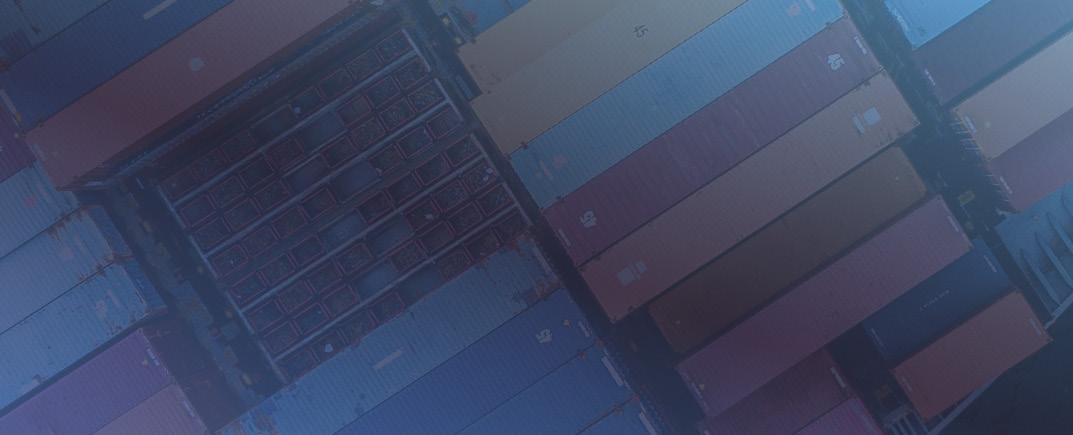







I have been living in Bristol for six years. This city is amazing. The culture and sport are everywhere.
I love walking in the countryside and enjoying some time with my friends in the pub. Love fish 'n'
'Give to get' is my Motto. In my previous experience in sales, one of my customers was not happy at all because we hadn’t changed his phone number. I was new to a company and he started to shout a me. I made sure I changed everything he would like to change ASAP and he eventually became my
I have a sales background in France and in England. I have a passion for my job. I like to connect people and make sure they will get on well and do a great
Recruitment is an exciting sector. You learn every single day.
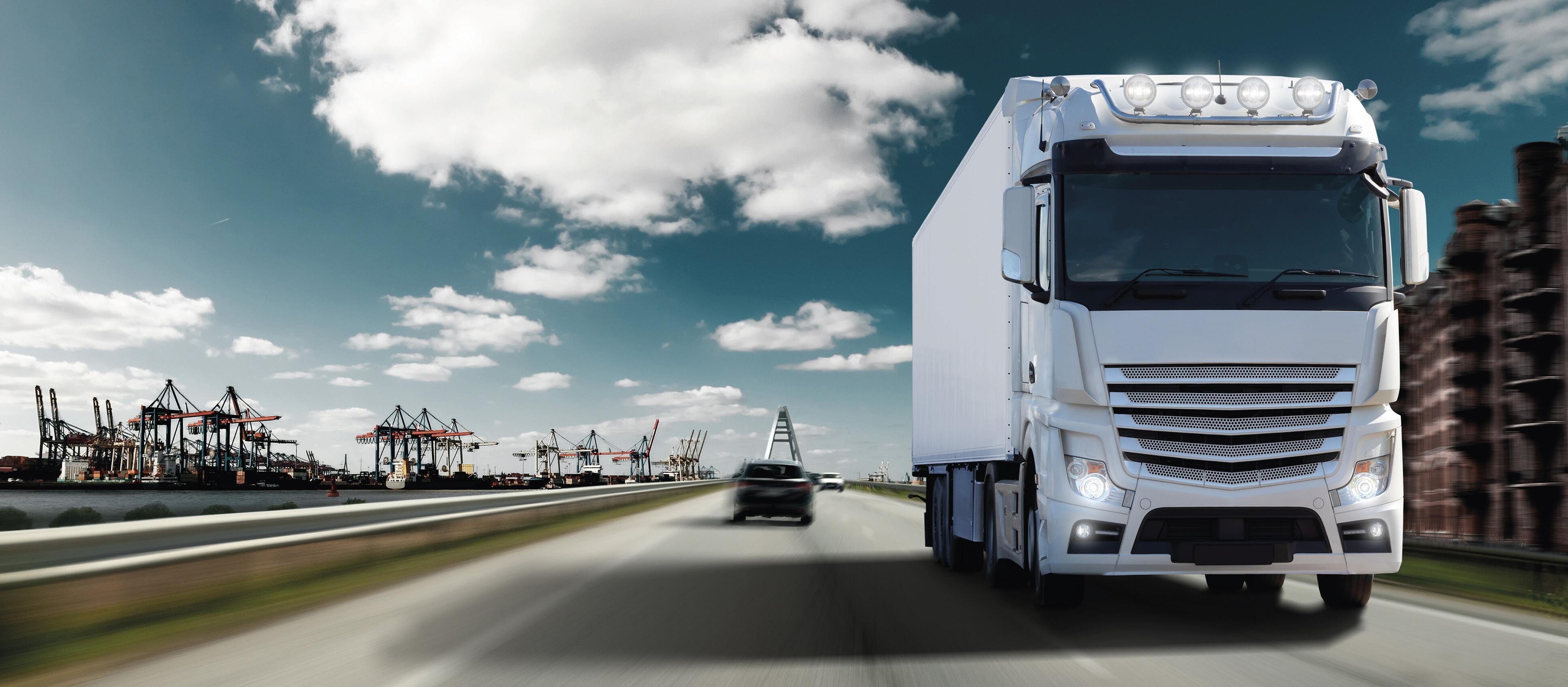














The consolidation of companies or assets through various types of financial transactions.
Related topics
Contracted partnerships
Management buyouts
Valuation
Sponsored by F REIGHT
Growth financing for shipzero to decarbonise transport logistics • Expansion of the data platform for more CO2 transparency along the supply chain • Support from investors with a sustainability mission
shipzero enables transport and logistics companies to create transparency about their emissions data throughout the supply chain. Now, the Hamburg-based data platform receives seven-figure growth funding for further product development and internationalisation. Through the data-based processing and analysis of transport data, the startup identifies and supports its customers in concrete decarbonisation projects. The investors include the Munichbased VC investor Rethink Ventures, which specialises in mobility and logistics, the sustainability-focused investment company ‘zu na mi’ and the London-based climate tech investor Rainmaking Impact.
With the funding, we will further expand the functionality and analytics capabilities of our data platform. We want to radically simplify emissions reporting, make it more accurate, and enable data-driven decisions and investments to accelerate decarbonisation in specific projects within the transportation sector.
Tobias Bohnhoff, co-founder & CEO, shipzeroThe awareness of a necessary transformation in the industry has grown steadily over the past two years. This is also reflected in the sharp rise in demand for the shipzero data platform. The team of logistics and data experts is now being requested by companies ranging from owneroperated freight forwarders to major corporations. Companies such as the Nagel Group, BLG Logistics, Lanfer Logistik and BSH Hausgeräte already rely on the expertise of the 23-strong team.
Transport and logistics companies are facing major challenges. Manufacturing companies, which purchase high volumes of transport, are demanding greater transparency and the ability of their service providers to report information on emissions data. Meanwhile, legal regulations are increasing the obligations for comprehensive CO2 reporting on the transports carried out.
At the same time, many companies struggle with the consolidation of their transport and order data from the various systems even before the actual CO2 calculation. We notice repeatedly, the biggest challenge is getting access to the most complete information possible. There is a lack of a holistic view of all movement and consumption data and a reliable quality of the data, says co-founder and data expert Mirko Schedlbauer. shipzero integrates primary data from diverse fleets and systems, including those of external logistics partners, into its platform. The CO2 calculation is thus not only based on projections, but on the actual energy turnover of the means of transport.
According to Bohnhoff, the coming financial years will be characterised by increasingly ambitious goals on the path to climate neutrality and the investments required to achieve them. The two founders know the specific challenges of the transport and logistics industry and have specialised the data platform and the team behind it in the complex logistics business. In the coming years, billions will be invested in alternative engines, fuels and infrastructure. Today, only a few companies can tell on a data basis where and when exactly this investment will pay off for them, and that's exactly what we want to change with shipzero, explains Tobias Bohnhoff.
On completion, Menzies Aviation will have a 65% market share in Portugal, with operations at five airports and more than 3,000 employees
Menzies aviation, the leading service partner to the world's airports and airlines, today signed a Subscription Agreement with TAP Air Portugal and Groundforce to acquire a controlling stake of 50.1% in Groundforce, the airline’s aviation services arm.
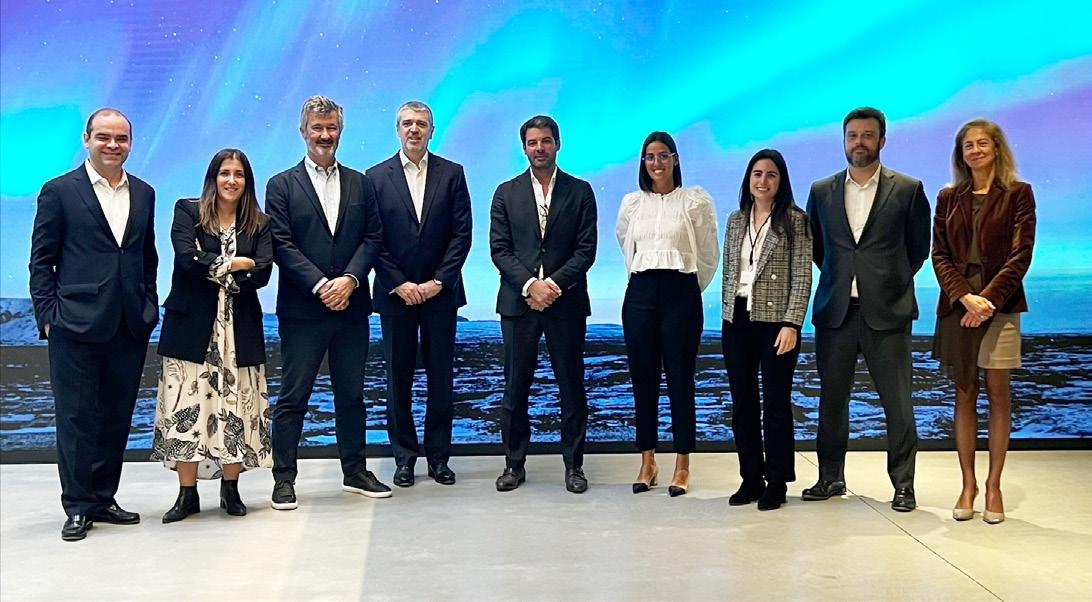
The agreement is a decisive step towards the recovery of Groundforce, reinforcing the confidence of all its stakeholders in the future of this company, and also a significant milestone in strengthening handling capacity, with an impact on the entire national economy.
Groundforce handles over 100,000 aircraft turns each year, across its operations at five of the busiest airports in Portugal: Humberto Delgado Airport (LIS) in Lisbon, Francisco Sá Carneiro Airport (OPO) in Porto, Gago Coutinho Airport (FAO) in Faro, Madeira International Airport (FNC), and Porto Santo Airport (PXO) on Porto Santo Island in Madeira. The aviation services company provides ground and air cargo services to several global airlines including TAP, its main customer.
The executed Subscription Agreement establishes the general terms and conditions of Groundforce’s Recovery Plan. Upon the granting of all necessary authorisations and consents, the Recovery Plan should be submitted by the Insolvency Administrators for the review discussion and approval by Groundforce’s Creditors Assembly.
For TAP, this process is crucial for the stability and improvement of the company's operational performance, with a direct impact on TAP's activity and the satisfaction of its customers.
National Aviation Services, which joined forces with Menzies Aviation last year under the ownership of Agility, was selected as a preferred bidder for Groundforce in August 2022.
We have strong conviction in the global aviation industry, and we are encouraged by the pace of recovery for both passenger and cargo volumes following the pandemic disruption. This transaction is further evidence of our scale and ability to enter a market in a meaningful way, as a long-term investor with a strong commitment to deliver industry leading services to airline and airport customers. We look forward to working with the Groundforce team to take advantage of the opportunities in this market.
Hassan El-Houry, Chairman, Menzies AviationGroundforce has had a leading position in the aviation services market in Portugal for decades and we are pleased to have signed this agreement which enables us to enter the market at scale. We will work to ensure a seamless transition for all stakeholders including airline customers and employees. This transition will enable to deliver the safest, most secure and consistent services to our airline and airport partners at these five airports across Portugal.
Philipp Joeinig, CEO, Menzies aviation








Hong Kong freight group says its integration with China’s S.F. Holding is ‘progressing smoothly and successfully’, reports 2022 growth in revenue and core net profit, but warns 2023 ‘will be one of the most challenging years in more than a decade’
Hong Kong-headquartered freight group Kerry Logistics Network (KLN) says its integration with China’s S.F. Holding is “progressing smoothly and successfully” but warns that 2023 will be one of the global logistics market’s toughest years in more than a decade.
Reporting full-year growth in revenue and core net profit in 2022, the first full year of its business integration and development with Chinese express and logistics group S.F. Holding, KLN said its record results in the first half of last year were unlikely to be repeated in the morechallenging environment this year facing logistics companies. However, the group’s Integrated Logistics (IL) business is expected to continue to see growth due to a rebound in retail sales and household consumption, especially linked to China.
William Ma, group managing director of Kerry Logistics Network, said the business integration and development between KLN Group and S.F. Holding, which began in 2021 when S.F. Holding bought a 51.5% stake in KLN, was ‘strengthening KLN Group’s Integrated Logistics (IL), International Freight Forwarding (IFF), and express service capabilities, particularly those within Asia’, with synergies particularly between the two operators’ air logistics activities.
Ma noted: To enhance KLN Group's air freight capacity and lastmile delivery capabilities, KLN Group is expanding its own-controlled air freight network and seeking new business potentials with S.F. Airlines by developing new products, services and trade routes. KLN Group’s cross-border express network in Southeast Asia has also gained ground. The synergies thus created are further increasing KLN Group’s competitiveness and diversity of global solutions it offers across the region.
Commenting on the outlook for this year, Ma said: The global economy is poised to experience a deeper slowdown in 2023 with greater market volatility, uncertainties and risks for the year. While the road back to full recovery will be long and bumpy, Asia exports will rebound gradually in 2023 Q2 at the earliest, in an optimistic scenario. 2023 will be one of the most challenging years for the global logistics market in more than a decade. Considering that KLN Group achieved record results in 2022 1H, the Group expects a considerable disparity for 2023 in comparison. Looking ahead, the Group will continue to take an active part in the global supply chain reshuffling as the logistics landscape evolves, while adapting to shifting market conditions to serve its customers’ ever-changing needs.
Those comments came as KLN reported a strong performance in 2022, in which revenue increased by 10% to HK$86.6 billion (US$11 billion). Although core operating profit dropped by 12% to HK$4.790 billion, core net profit increased by 11% to HK$3.57 billion.
The IFF division reported ‘only a 3% drop’ in segment profit in 2022, to HK$4.70 billion, ‘despite an extremely volatile market’, as ‘Asia exports plunged in 2022 2H, as global demand for finished products and purchase orders started falling. Coupled with a swift increase in both ocean and air freight capacity, freight rates tumbled from unprecedented highs within a short period of time, putting the global freight forwarding sector under tremendous pressure.’
KLN added: Extraordinary events and world affairs continued to reshape the global supply chains. Higher freight capacity and low cargo volume were spread across countries, posing increasing challenges to the freight forwarding industry. Nonetheless, the IFF business was able to maintain its profit margin at a similar level as the previous year and will continue to actively look for new business opportunities.
The segment profit of the IL division recorded a 28% growth, to HK$1.38 billion, ‘supported by the increase in demand for pandemicrelated services in Hong Kong as well as the rebound of production activities in Asia. Following the subsequent reopening of the Mainland of China, the IL segment is expected to maintain its growth momentum in 2023, riding on a rebound in retail sales and household consumption.’
Meanwhile, the group’s E-commerce and Express (E&E) division registered ‘a drastic decline in its segment profit due to the intense competition Kerry Express Thailand faced in 2022.’ KLN’s E&E business recorded a segment loss of HK$826 million, down from a profit of HK$41 million in 2021.
KLN said, a series of restructuring and lean programmes” had been launched to improve profitability, and the loss for the E&E division “is expected to narrow in 2023.
In February 2021, Kerry Logistics Network Limited and S.F. Holding announced a strategic investment and cooperation agreement between the two companies, to ‘bring together the core competencies of S.F. Holding and Kerry Logistics Network across multiple verticals to create a leading Asia-based global logistics platform.’
Under the strategic cooperation, with S.F. Holding acquiring a 51.5% stake in KLN, Kerry Logistics Network will be positioned as S.F. Holding’s ‘platform for international business’, with S.F. Holding and KLN to ‘collaborate with each other in Greater China to better align their respective businesses.’ By tapping into different customer segments, the intention was for S.F. Holding and Kerry Logistics Network to coexist as separate entities in Mainland China, Hong Kong and Macau, and KLN to continue to grow its logistics businesses, both in terms of scale and coverage. The partnership is expected to create significant synergies to boost both companies’ growth and leadership in the logistics sector with clear business focuses and complementary strengths to bring value to investors.
Freight Mergers have been appointed by a large UK logistics provider who are part of a wider global group. Freight Mergers are looking to source relevant acquisition targets that match their criteria. This buyer is looking to facilitate a timely and smooth transaction within 2023; they are open to introductory meetings over the coming weeks and months. They feel they will be a suitable custodian for any business where the director(s)/shareholder(s) are aiming to retire or move on to their next chapter.
• £25m+ Revenue
• £5m+ GP per annum
• Air freight focused
• Head office: UK based
• Strong Senior Management Team
• Asset light (unless a warehouse is owned in the North West)
• Flexible regarding the deal structure of the owner
• Far East
• Indian Subcontinent
• US/Canada
• Middle East
• Turkey
2021
Turnover: £232m
Gross Profit: £41.9m
Profit Before Tax: £28.2m
Cash in Bank: £28m
UK wide
REFERENCE
Project North
CONTACT
Alexander Jones , M&A Consultant
alexander.jones@freightmergers.com +44 (0)1454 275 933
This is a UK company based in the East. They have been established in excess of 20 years and are run by two shareholders. The owners now want to become part of a larger group where they can expand and develop their resources. They are willing to stay with the business for a period of two-to-five years to assist with the growth and ensure there is a clean transition.
• 2 shareholders
• Est. 20+ years
• Europe/UK
• Events
• Construction
• Food & drink (Ambient)
• Manufacturing
• Road freight: 90.45%
• Rail freight: 3.92%
• Customs clearance: 5.51%
• Ocean/Air: 0.12%
100% controlled
Project Port
Revenue
2021: £6,994,226
2022 (forecast): £6,586,381
Gross profit
2021: £1,142,661
2022 (forecast): £1,059,360
Net profit
2021: £317,910
2022 (forecast): £418,777
East UK
Alexander Jones , M&A Consultant
alexander.jones@freightmergers.com
+44 (0)1454 275 933
The promotion and dissemination of knowledge and information about products and organisations both externally and internally.

Related topics
Website design
Social media
Promotional techniques
Sponsored by
DP World and Indian cricket team Delhi Capitals today announced a long-term partnership. DP World, a leading provider of smart end-to-end logistics, is now the Global Logistics Partner of the popular cricket franchise.
The new multi-year partnership, unveiled today at the Leela Palace Hotel in New Delhi, will see DP World featured prominently on the back of Delhi Capitals official match jerseys as well as training gear.

The partnership extends beyond logistics to a shared vision of highperformance premised on innovation. This vision also resonates well with the Indian capital, New Delhi, a multi-cultural city and a global hub, that like DP World, connects across borders.
Over the years, cricket has transformed itself, with ever evolving formats unlocking enormous potential for players across the world and making the game engaging and exciting for a diverse set of audiences. Similarly, DP World is relentlessly focused on innovation, constantly seeking out new opportunities to revolutionise global trade and open opportunities for our customers to grow. We are delighted to announce this partnership bringing together two leading organisations that are ready to go beyond conventional boundaries to change what’s possible for everyone.
Rizwan Soomar, CEODP World, through its world-class multimodal logistics capabilities spread across more than 75 countries, ensures seamless movement of trade around the world, including India. The company plays a critical role in supporting the game of cricket across the world. From transporting the cork of cricket balls to moving the willow that is used for making bats, DP World’s agile, reliable, and transparent supply chain solutions are helping make cricket possible for players across the globe.
We are excited to sign a multi-year partnership with DP World. The organisation is a global leader in logistics and therefore it's a huge privilege for us to have DP World as our Global Logistics Partner. The organisation has a strong global presence, and it will certainly help us grow the Delhi Capitals brand.
Dhiraj
Malhotra , CEO, Delhi CapitalsThe 2022 T20 season was viewed by over 400 million fans across the globe, making it one of the largest sporting events in the world. Partnering with Delhi Capitals provides DP World with a vibrant platform to engage with customers, prospects, and stakeholders within India and beyond.
The new partnership is part of DP World’s growing global portfolio of cricket partnerships. The company is the title partner of the DP World ILT20 in the UAE, and the naming rights partner of the DP World Lions and the iconic DP World Wanderers Stadium in Johannesburg. The company also became the title partner of the DP World Asia Cup, that took place in the UAE in 2022.
DP World will begin their exciting journey with Delhi Capitals with one of cricket’s most brilliant minds, Ricky Ponting guiding the team, against Lucknow Super Giants on 1 April 2023. The season will see Delhi Capitals returning home to the Arun Jaitley Cricket Stadium after 3 years.
KlearNow’s A.I. and M.L.-powered platform expedites customs entry and haulage processes and improves productivity for brokers, Importers of Record and truckers by automating data capture, identifying exceptions and eliminating defects, overproduction issues, waiting times, and manual rework. KlearNow also delivers end-to-end shipment visibility to all related parties at the same time. Combined with the speed and accuracy of its customs clearance and haulage process, which eliminates bottlenecks and costly delays, many organisations have already adopted its platform.
KlearNow has announced a rebrand to KlearNow.AI to better reflect the company's continued commitment to advancing the global logistics industry with cutting-edge artificial intelligence (A.I.) and machine learning (M.L.) technologies.
Based on an A.I. and M.L.-driven ingestion platform, KlearNow.AI helps power Industry 4.0 by digitising and automating import processes, dynamically connecting importers, customs brokers, freight forwarders, carriers and truckers with shipments. This provides real-time tracking of containers from origin to destination, extending shipment visibility and data connectivity. The technology can also determine the precise cause of delays and immediate actions needed to remedy the situation.

Traditionally, supply chain management software resided only within defined, static ecosystems and silos. Once a shipment is outside of the original ecosystem, the linkages break, and data is transferred unstructured. Our proprietary A.I. and M.L.-powered platform structures this data automatically and is designed to be completely agnostic, connecting all parties within one platform to avoid any gaps in communication. This simplifies the entire logistics process, increases productivity and revenue and addresses labour shortages.
Rick Tellez , Co-founder, KlearNow.AIDocuments vital to the shipment of billions of dollars of goods across borders have traditionally been handled through manual, paper-based entries and emailed as attachments, creating extreme complexity for importers, exporters and freight forwarders trying to manage hundreds of shipments simultaneously. Our innovative A.I. is drastically improving the usability of digital data flows, and KlearNow.AI’s swift expansion in Europe and India emphasises the industry’s desire to digitise the entire supply chain.
Sam Tyagi, CEO & co-founder, KlearNow.AIWith a rapid 30-fold growth over the last two years, KlearNow.AI has emerged as a leader in Logistics-as-a-Service (LaaS), providing smart solutions that help businesses address the increasingly complex challenges facing supply chains today. This rebranding represents a pivotal moment in the company's journey and underscores its commitment to leveraging A.I. and M.L. to drive even greater innovation and automation of workflows in the logistics sector.
KlearNow has quickly expanded its presence beyond the US to the UK, Canada, India, Spain and now the Netherlands. It has doubled its global employee base and added more than 1,000 new customers in various industries, including furniture, industrial/manufacturing, food & beverage, automotive/transportation, apparel/footwear and chemicals.






Gebrüder Weiss transports high-tech drilling robot to Texas for students at ETH Zurich / Lothar Thoma: ‘Hyperloop project underscores our commitment to the future of mobility’
Proud of a top position and an award in the Hyperloop competition: The Swissloop Tunneling team from ETH Zurich, sponsored by Gebrüder Weiss (Source: Eugenio Valli)

At the 2023 "Not-A-Boring Competition" in Bastrop, Texas, at the beginning of April, the "Swissloop Tunneling" team from the Swiss Federal Institute of Technology (ETH) in Zurich won the top prize for innovative design. Sponsored by Gebrüder Weiss, the group of more than 40 students retained their title as the team with the most innovative design in this competition hosted by The Boring Company. In advance, the global transport and logistics company ensured the on-time and secure transport of the critical drilling technology from Switzerland to the USA.
Investment in the future of mobility and in ways to improve sustainability is critical for us and the industry. We participate in projects such as the Hyperloop, the Mars Mission, the SubOrbital Express rocket mission and work to develop alternative drives because it amplifies the values of Gebrüder Weiss and puts them into action.
Lothar Thoma , Managing Director Air & Sea, Gebrüder Weiss
The final stage of the competition set five of the globe’s most innovative and ambitious engineering teams against each other to be judged in four categories: (1) fastest tunnel completion, (2) innovative design, build and/or test, (3) most accurate tunnel, and (4) tunnel with tightest curve. In addition to 2nd place overall, Swissloop Tunneling won the innovation category. The concept of the Hyperloop project is to transport people and goods at high speed over longer distances through tunnels under or above the earth's surface to their destination. The drilling robots must be as fast, compact, and as automated as possible to make tunneling financially feasible.
Our team has been very lucky to have Gebrüder Weiss as our logistics partner for the past two competitions. Knowing that they hold similar values and believe in investing in the future of mobility adds to our team’s confidence. Over the past few years, we've all come to appreciate the critical role played by logistics companies in our world. None of this would have been possible without their support.
Stefan Kaspar, Founder & Co-President, Swissloop Tunneling
The 95-second film (click here) which was made by London and Berlin-based production company Cat and Weasel working with leading European director Joshan Esfandiari Martin, explains how the logistics solutions which DP World provides enable customers to move goods smoothly and efficiently in and out of the UK at the same time as bringing prosperity to people’s lives.
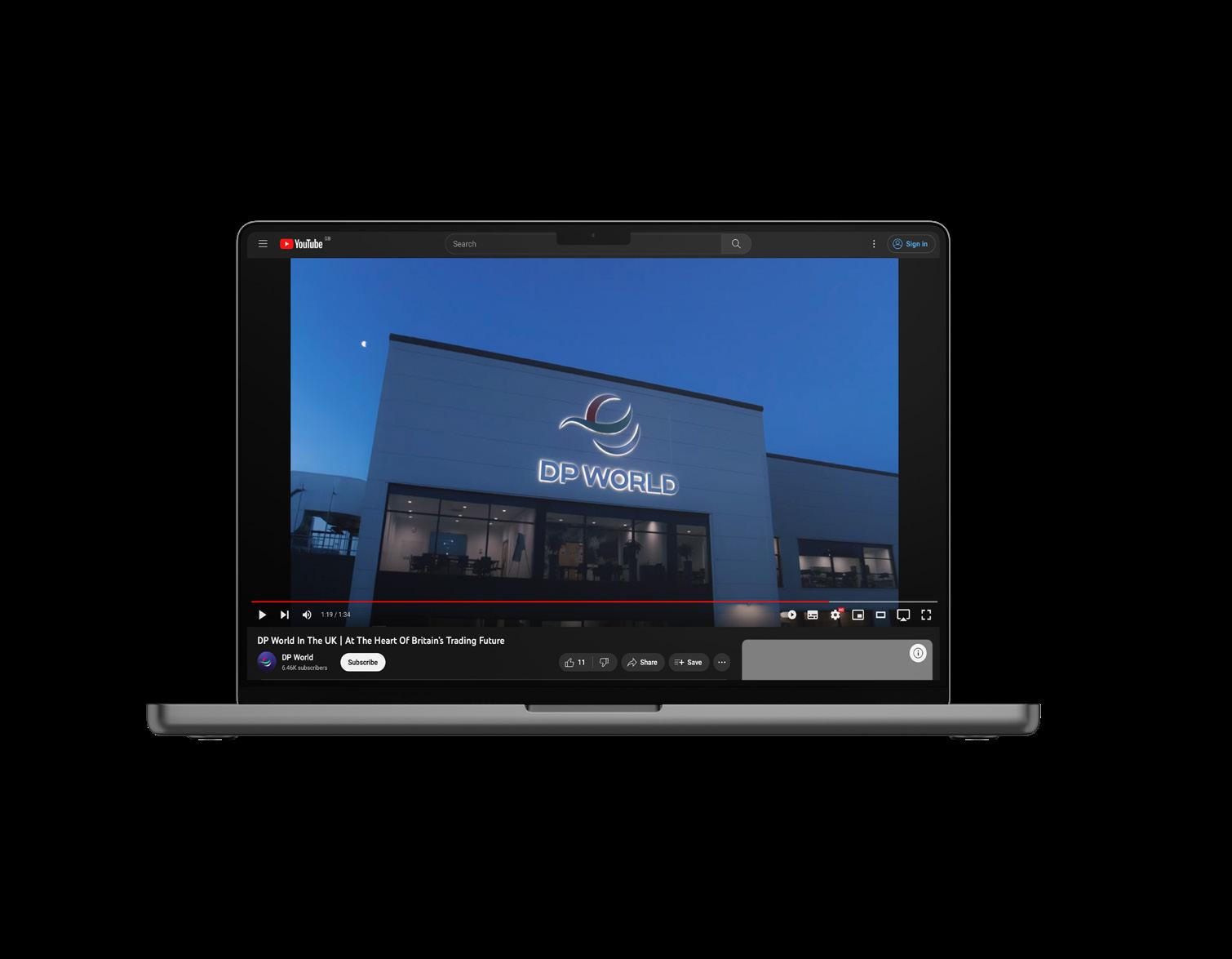
DP World operates the UK’s most advanced logistics hubs: two deep water ports at Southampton and London Gateway with access to freight rail terminals, and a rapidly expanding logistics park on the doorstep of the capital. It makes a major contribution to the UK economy, handling over £43 billion of goods a year.
The video can be watched online at www.youtube.com/watch?v=2ef1DcBKOnU
This film demonstrates our commitment to consolidating our place at the heart of Britain’s trading future, providing the right infrastructure, smart logistics solutions, and the benefits of Freeport status to our customers. Demand at our port-centric logistics park at London Gateway remains robust, utilisation of the new train linking our two UK terminals continues to grow, and we will extend our reach further into the supply chain in the coming months and years.
Ernst Schulze, UK Chief Executive, DP WorldBusinesses are looking for new and better solutions that make their logistics more efficient, more agile and more reliable, all whilst seeking specialised local-to-global expertise that can help move goods where others cannot. Customers have a growing need for partners who can provide more sustainable, cost-effective solutions to simplify complex logistics challenges. We believe in the UK market and have the ambition and the resources to boost growth, support businesses, create jobs and improve living standards.
John Trenchard, Supply Chain Director, DP WorldDP World saw a 5% rise in the volume of trade handled by its two hubs in the UK last year. London Gateway alone reported a 14% rise in volumes to 2,053,000 TEU – the first time it has ever exceeded two million units in a year, consolidating its position as Britain’s second biggest container terminal. Together with Southampton, the two terminals handled a record 3,850,000 TEU compared with 3,675,000 in 2021.
Over the last 10 years DP World has invested £2 billion in the UK, supporting thousands of jobs. Over the next 10 years the logistics provider has earmarked a further £1 billion of investment, with a £350m new fourth berth at London Gateway now under construction.
Advertising: +44 (0)1454 628 795 tony@

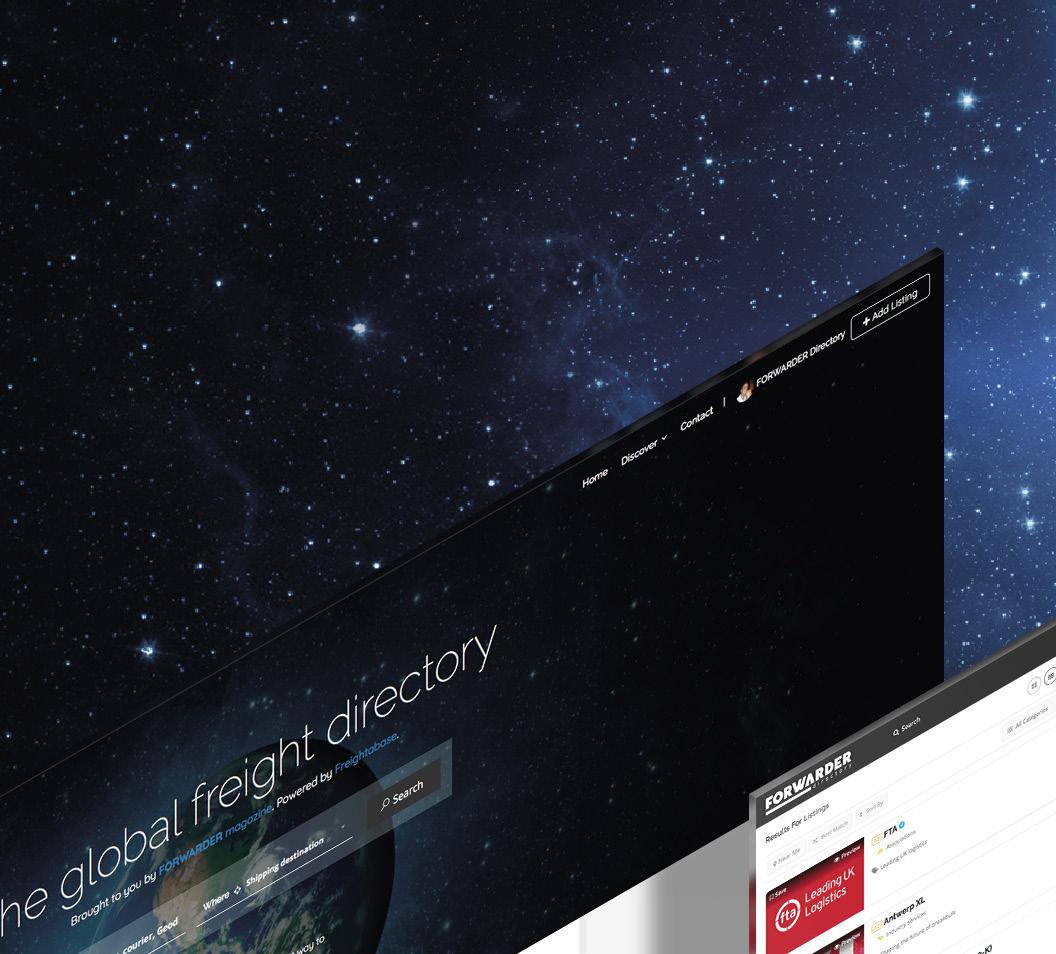







 FROM FORWARDER MAGAZINE POWERED BY FREIGHTABASE
FROM FORWARDER MAGAZINE POWERED BY FREIGHTABASE







We know you're a generous, caring bunch in the freight world. Let us help you get your message out there... Related
The recent installation of Samskip’s first CO2 exhaust gas cleaning system on one of its shortsea vessels was performed while docked at shipyard Royal Niestern Sander.
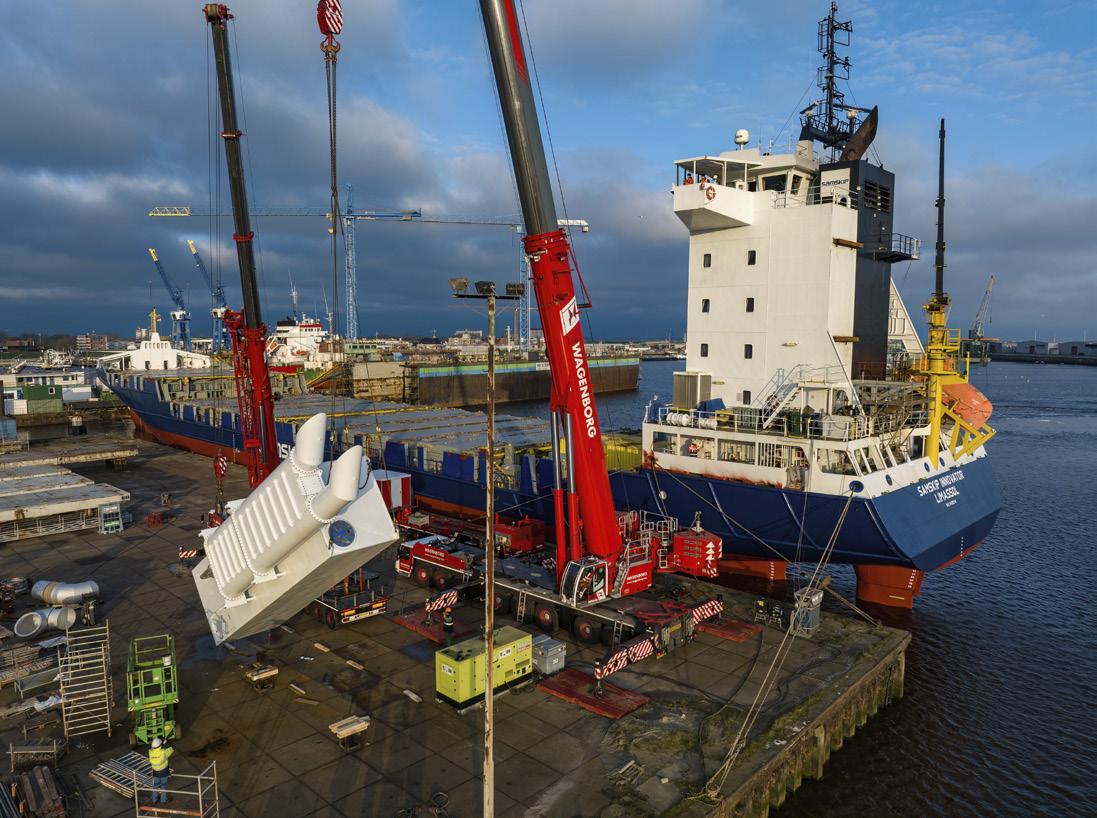
Royal Niestern Sander is widely known and respected for its innovative and sustainable ship designs, conversions and projects.
Samskip has recently embarked on a new innovative project that will reduce CO2 emissions for its vessels. Samskip’s Carbon Capture and Utilization system is a clever and sustainable application that in real-time captures 30% of the CO2 emissions generated by combustion engines and stores it in portable batteries. These batteries can then be delivered to businesses that utilize CO2 such as agricultural clients and greenhouses which currently use gaspowered machinery to create the CO2 needed to stimulate growth of their products. The captured CO2 can then immediately be used bypassing the need for the gas-powered machinery, in turn reducing the use of natural gas.
The Samskip organization has long been recognized as one of the prominent leaders in green logistics and sustainability. Having just received the prestigious EcoVadis Gold Medal for 2023 based on its performance in Environment, Labor & Human Rights, Ethics and Sustainable Procurement, Samskip ranked within the top 2% of its industry peers for all these topics and continues to look for innovative methods to pioneer sustainable solutions and services.
In recent years, we have seen more and more ship owners invest in sustainable applications for their ships. Niestern Sander Repair has always been there providing essential support for such initiatives and for proactive innovators such as Samskip and the installation of their Carbon Capture and Utilization system. Such systems effectively reduce harmful emissions while considerably extending the lifespan of such a ship in this era where strict requirements for sustainability are becoming increasingly necessary. We are proud that a pioneer like Samskip is taking on such a project together with our yard.
Bart Volgers, Director, Niestern Sander RepairThe Carbon Capture and Utilization system is one of many Samskip initiatives and is also an important step towards reaching the sustainability targets outlined in our latest sustainability report, as we demonstrate our commitment to Samskip’s Science Based Target initiative of reaching Net-Zero by 2040. We believe that the well-being of our planet is everyone’s responsibility. So, we strive to not only drastically reduce our CO2 emissions and focus on the issue of the changing climate and our planet, but we also strive to contribute to the solutions and preserve our ecosystem. We are very excited to launch our first vessel using the CCU system to reduce our emissions, store and utilize the captured CO2 to support other businesses to reduce their use of natural gas. This is the definition of sustainability!
Erik Hofmeester, Head of Fleet Management, SamskipIn a bid to provide lifesaving protection for its hundreds of team members, Panther Logistics has installed defibrillators at all its depots
To ensure essential lifesaving first aid can be immediately administered at all its UK sites during a medical emergency, Panther Logistics has invested in defibrillator devices and specialist staff training at all its depots.
Crucially, the defibrillators will also be made available to emergency first responders and ambulance crews operating within every depot’s vicinity, should medics need access to them to help save a patient’s life.
Panther depots joining a nationwide network of defibrillators accessible to all emergency medical crews in the towns and cities where Panther’s businesses are based will potentially help save the lives of hundreds of more patients in urgent need of lifesaving medical intervention.
Panther’s lifesaving initiative was inspired by the experience of a father of three and successful businessman, who collapsed and suffered a cardiac arrest while at a football session with friends following one of the pandemic lockdowns.

Tony Entwistle revealed how he was ‘dead’ for a matter of minutes during the medical emergency at his football session at GOALS in Northampton.
He was brought back to life by the rapid response of GOALS General Manager Elliott Holmes, who was onsite when Tony collapsed and used the facility’s defibrillator to restart Tony’s heart during the dramatic on pitch incident. Elliott was assisted by former fireman, Ryan Grant, who happened to be playing on a pitch nearby and attended the medical emergency to administer critical CPR.
Hearing about Tony’s experience and how having immediate access to a defibrillator saved his life, inspired Panther Logistics to invest in installing the critical care devices at all the company’s depots nationwide.
When Elliott told myself and Managing Director Gary McKelvey how he had been able to help save Tony’s life by using a defibrillator we knew immediately we had to have the devices in situ at all our sites.
Samuel Scott , Sales Director, Panther Logistics & longstanding friend of Elliott
Tony, co-owner of Fed3 Projects, a construction project management consultancy based in Northampton, recalled how on the pitch he had experienced a ‘massive dizzy spell’ and his legs had buckled beneath him before he collapsed.
He said: I was actually dead. Thankfully Elliott was working that day and when he and Ryan quickly realised CPR wasn’t restarting my heart Elliott, who had previously had training, knew it was time to use the defibrillator. Having been officially dead for a number of minutes, Elliott managed to restart my heart using the device and they continued CPR until the ambulance crew arrived. Elliott and Ryan are my heart heroes, they saved my life – I nominated them for British Heart Foundation Awards and was delighted when they were announced as winners. Having heard about my personal story I think it is fantastic that Panther has installed defibrillators at all of the company’s depots. More than 30,000 people in the UK suffer cardiac arrests every year and if you are not near a defibrillator your chances of survival are tiny, I was lucky, I was in the right place at the right time.
Elliott and Tony, who has since stopped playing football but now coaches youth teams and still enjoys an active lifestyle, went on to become firm friends following the incident.
Elliott said: On the day it happened a call went out for a doctor as someone had collapsed on pitch. Just the day before I had refreshed my first aid training, including using a defibrillator and I took our onsite device with me when I rushed to the scene. Tony was unconscious and not breathing. Ryan arrived to support me administering CPR. I was determined; due to my GOALS training I knew what I had to do. When I told Samuel and Gary at Panther what had happened, they were blown away and took immediate steps to install defibrillators at all the company’s sites, which is great.
Samuel added: Defibrillators were installed at all our depots and 24 employees have undergone specialist training to ensure there is always someone on site that can use the device should it be needed.

Our television screens and newspaper front pages are full of pictures and words from the intense and bloody conflict in Ukraine. We can all see that this conflict is threatening the lives and livelihoods of millions of civilians across the country. Thousands are fleeing. People have been injured. Many lives have been lost.
Readers of FORWARDER magazine may feel helpless in responding to this crisis. That is why staff at FORWARDER magazine have created a positive channel for financial support from our readership to get money right to those who need it most in this crisis. We are completely behind the by Disasters Emergency Committee (DEC) Ukraine Humanitarian Appeal because the civilian population in Ukraine needs our help like never before.
DEC charities and their local partners are in Ukraine and across the border in the neighbouring countries are working to meet the immediate needs of all people fleeing with food, water, medical assistance, protection and trauma care. Every pound donated by the UK public, including big-hearted FORWARDER magazine readers, will be matched by the UK Government up to £20 million. Readers of FORWARDER magazine who donate to DEC through our donation page, can be reassured that a sum of £30 could provide essential hygiene supplies for three people for one month, £50 could provide blankets for four families to keep them warm while £100 could provide emergency food for two families for one month.
Readers of FORWARDER magazine work in a globally-connected industry. The hurt that is being felt in Ukraine is being felt around the world by those whose business it is to move goods across the globe.
VISIT













CRAIG EDITOR-IN-CHIEF
WILL CONTRIBUTING EDITOR
PAUL MEDIA / EVENTS MANAGER





TONY SALES EXECUTIVE
MARK SALES EXECUTIVE


TIM DESIGNER
MOHIT DIGITAL & SOCIAL
Thanks for reading. Our next printed issue will be the one we present at Multimodal in June. We hope to see you there. Hopefully we’re seeing you in Manchester at our event right now and we can talk about it face to face.
We hope you’ve enjoyed reading Atlantic Pacific’s feature about Chrissy Nichols. It will be highly relevant at the event, as the discussion panel will be focused on women in freight.

Please keep the great content flowing our way, and we’ll present it to the freight and logistics world, with love from FORWARDER
Tim, Designer, FORWARDER
If you’re reading this before the event, hope to see you there. If you’re reading this at the event...ah, lovely to see you!
If you’re reading this after the event, see you at the next one Check it out using the QR code or at FORWARDER .events


We hope you like the new format and hopefully there will be a section that is of interest to you every month. Feel free to get involved!
To re-iterate, the main sections are...
AIR FREIGHT
SEA FREIGHT
ROAD FREIGHT
RAIL FREIGHT
PROJECT CARGO
PORTS & HUBS
TECH & DIGITISATION
EXHIBITIONS & EVENTS
CUSTOMS CLEARANCE
INDUSTRY SERVICES
CRISIS RESPONSE I'M NEW!
RECRUITMENT & TRAINING
MERGERS & ACQUISITIONS
MEDIA & MARKETING
GIVING BACK
If you would like your editorial to feature in next month’s magazine, please contact our editor using the contact details to the right. If you would like to advertise in FORWARDER magazine , full details of our rates and technical specifications can be found in our media pack. Please email us for a copy.
FORWARDER magazine is free in the UK. Please email for a subscription form.
Please visit us online at forwardermagazine.com
magazine.com
When you’re finished with this magazine, please
